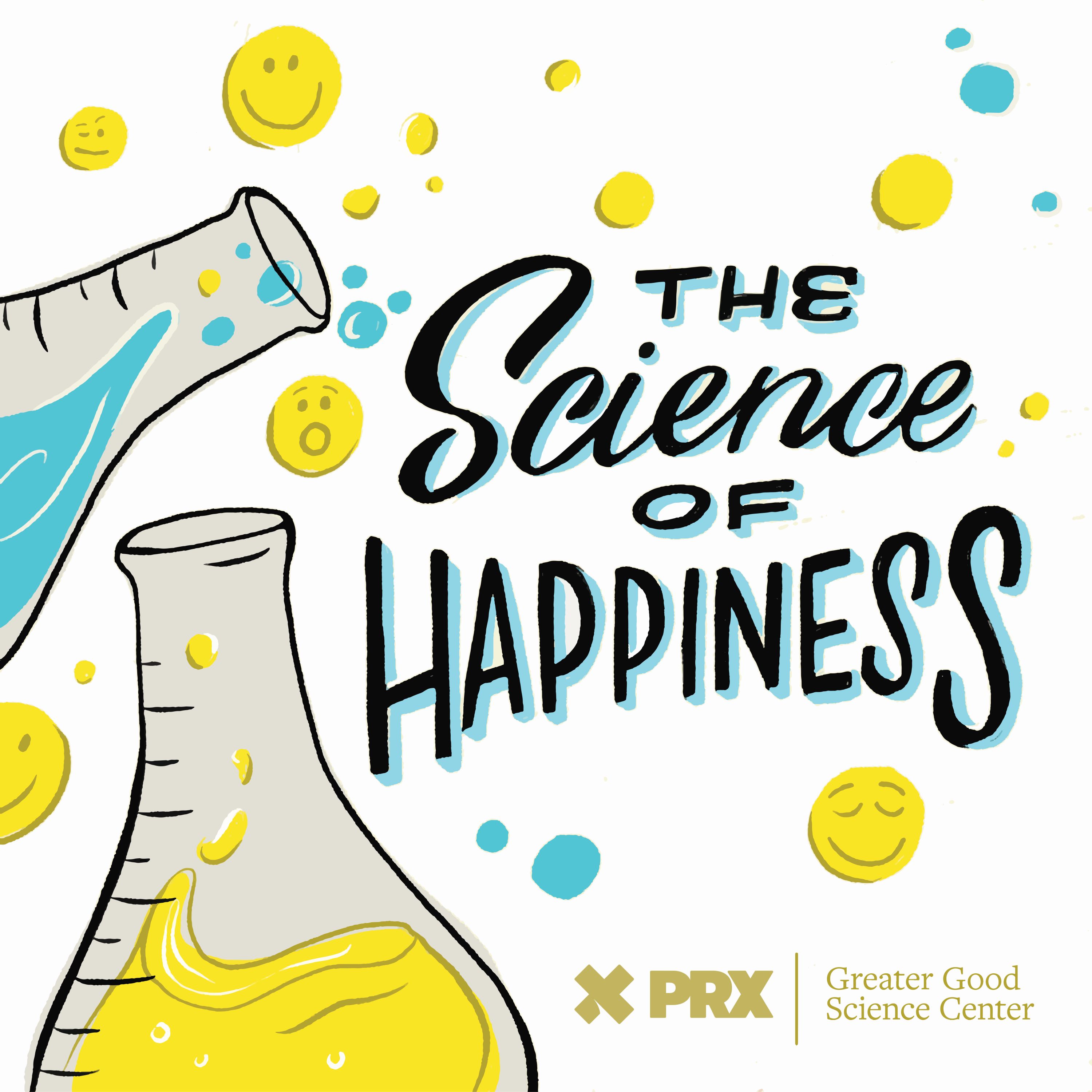326 episodes
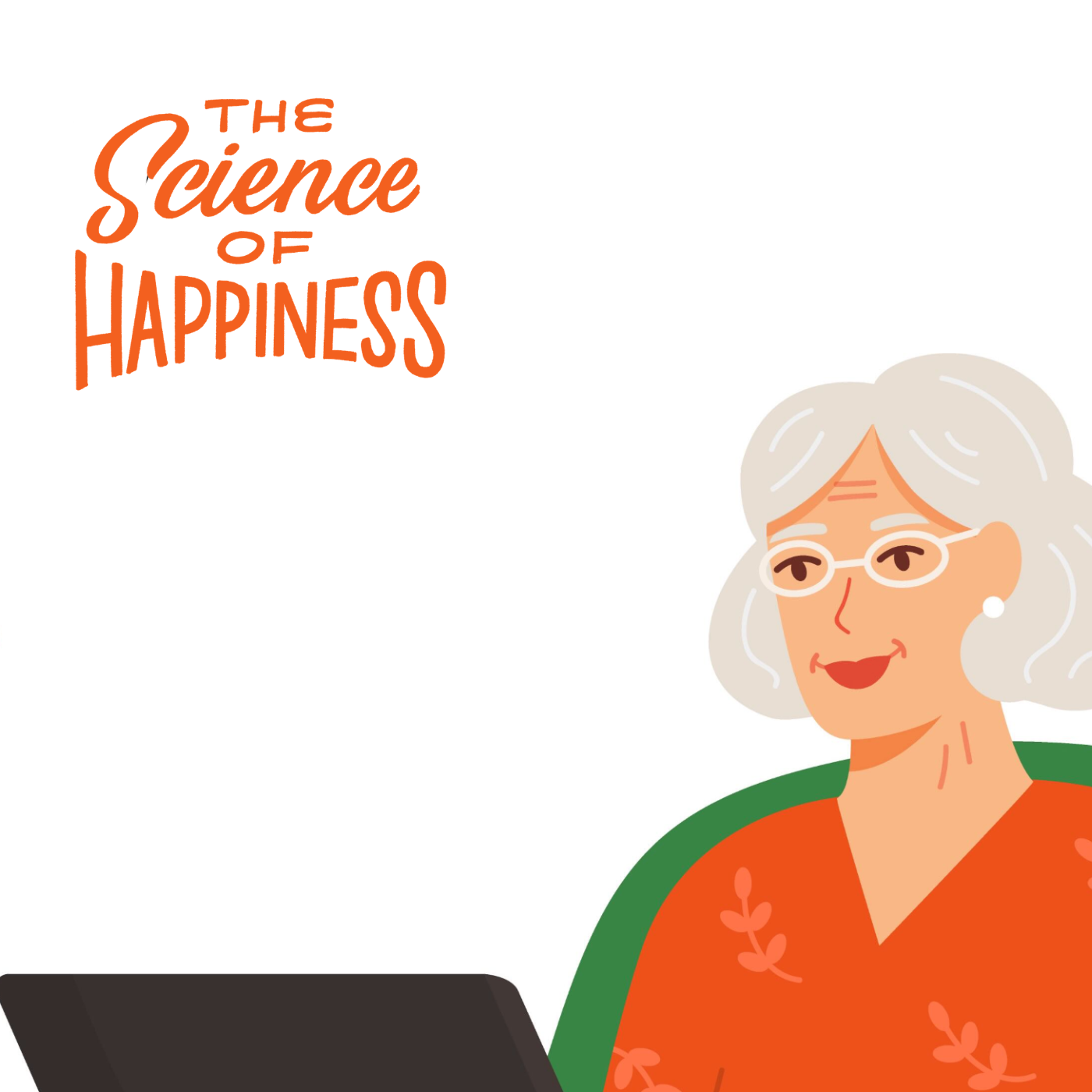

Finding ways to bend tasks toward your strengths and passions can make you happier, more productive and find more meaning in your life—no matter your job. Summary: On this episode of , we explore a research-backed practice in Job Crafting, where you take stock of the tasks that fill your day, how much time and energy they require, what really lights you up, and what changes you can make to better align your efforts at work with your genuine strengths and passions. We learn how Job Crafting doesn’t just benefit your own well-being and help to guard against burnout, it can also boost your whole team’s productivity and morale. HOW TO DO THIS PRACTICE: __ TAKE A “BEFORE” SNAPSHOT: Write down everything you regularly do in a typical week, from major responsibilities to small recurring tasks. LABEL TIME AND ENERGY: Next to each activity, mark whether it requires low, medium, or high time and energy so you can see where your resources are going. NOTICE HOW IT FEELS: Pay attention to what drains, stresses, or creates guilt—and what energizes or uplifts you. RECONNECT WITH WHAT MATTERS: Ask yourself what you most care about right now and what activities make you feel most alive. SKETCH AN “AFTER” VERSION: Imagine how you’d ideally spend your time and where you might reduce, release, or expand commitments. MAKE ONE SMALL CHANGE: Choose one realistic shift you can try this week to better align your days with what brings meaning and joy. __ TODAY’S GUESTS: SUSAN GLASS is a retired English professor and visually impaired, Bay Area-based poet. She’s the author of the poetry book “The Wild Language of Deer.” Read Susan’s book here: HTTPS://TINYURL.COM/2JN3JUTT https://tinyurl.com/2jn3jutt MARIA TIMS is a professor of Management and Organization at the University of Amsterdam School of Business and Economics. Learn more about her work here: HTTPS://TINYURL.COM/MTP7TPY3 https://tinyurl.com/mtp7tpy3 RELATED THE SCIENCE OF HAPPINESS EPISODES: How To Show Up For Yourself: HTTPS://TINYURL.COM/56KTB9XC https://tinyurl.com/56ktb9xc How To Feel Better About Yourself: HTTPS://TINYURL.COM/42FN62A2 https://tinyurl.com/42fn62a2 How to Feel More Hopeful: HTTPS://TINYURL.COM/4TFWHBPB https://tinyurl.com/4tfwhbpb RELATED HAPPINESS BREAKS: A Self-Compassion Meditation For Burnout: HTTPS://TINYURL.COM/485Y3B4Y https://tinyurl.com/485y3b4y 5 Minutes of Gratitude: HTTPS://TINYURL.COM/R6PKW2XX https://tinyurl.com/r6pkw2xx A Meditation to Connect With Your Roots: HTTPS://TINYURL.COM/YCY9XAZC https://tinyurl.com/ycy9xazc Tell us about your experience with this practice. Email us at happinesspod@berkeley.edu or follow on Instagram @HAPPINESSPOD https://www.instagram.com/scienceofhappinesspod/#. Help us share The Science of Happiness! Leave us a 5-star review on Apple Podcasts and share this link with someone who might like the show: HTTPS://TINYURL.COM/2P9H5AAP https://tinyurl.com/2p9h5aap https://tinyurl.com/568punx8
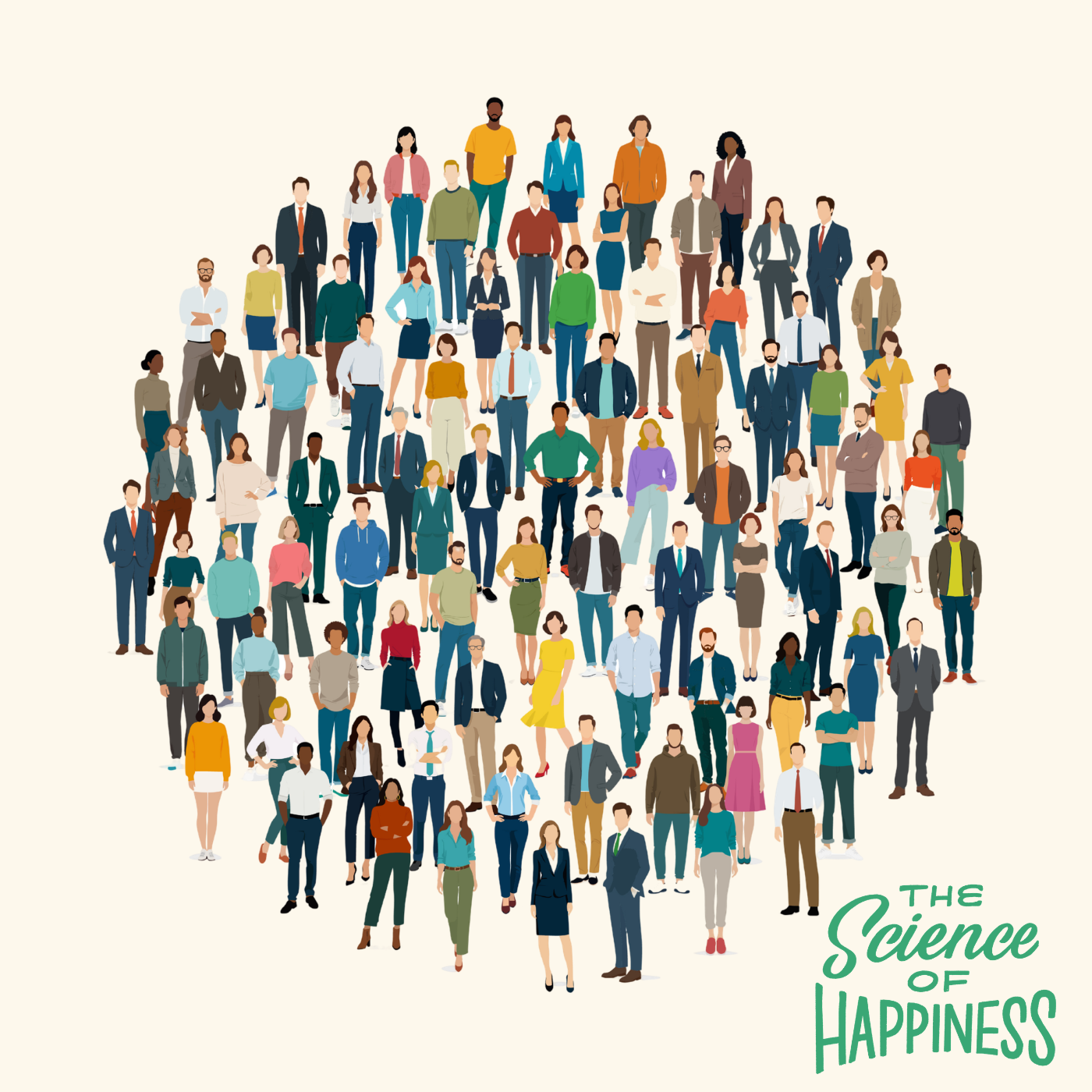

Research shows that reflecting on our shared humanity can increase self-compassion and life satisfaction while reducing feelings of isolation. In this practice, Dacher Keltner guides us to look beneath our differences and connect with the qualities that make us human together. https://ggia.berkeley.edu/practice/common_humanity_meditation HOW TO DO THIS PRACTICE: __ SETTLE YOUR BODY: Sit comfortably and take a few slow, steady breaths. Let your shoulders drop, soften your jaw, and allow your body to feel supported by the ground or chair beneath you. NOTICE WHAT’S HERE: Briefly scan your body and emotions. Whatever you’re feeling—calm, tense, distracted, open—simply acknowledge it without trying to change it. BRING SOMEONE TO MIND: Think of someone you don’t know well, feel distant from, or have mild tension with. Picture them as if they were in front of you. REFLECT ON YOUR SIMILARITIES: Silently repeat phrases like: This person has a body and mind, just like me; this person has felt sadness, joy, and pain, just like me; this person wants to be safe, loved, and understood, just like me. GENTLY EXTEND KIND INTENTIONS TOWARD THEM: May you be well. May you be happy. May you be healthy. May you live with ease. RETURN AND REFLECT: Bring your attention back to your breath and body. Notice if anything has shifted—perhaps a softening, a little more space, or a sense of connection—and carry that awareness into your day. __ RELATED HAPPINESS BREAK EPISODES: A Meditation for When You Feel Uneasy: HTTPS://TINYURL.COM/4X27UT3P https://tinyurl.com/4x27ut3p A Meditation to Connect With Your Roots: HTTPS://TINYURL.COM/YCY9XAZC https://tinyurl.com/ycy9xazc A Mindful Breath Meditation, With Dacher Keltner: HTTPS://TINYURL.COM/MR9D22KR https://tinyurl.com/mr9d22kr RELATED THE SCIENCE OF HAPPINESS EPISODES: Why Compassion Requires Vulnerability: HTTPS://TINYURL.COM/YXW4UHPF https://tinyurl.com/yxw4uhpf How to Feel More Hopeful: HTTPS://TINYURL.COM/4TFWHBPB https://tinyurl.com/4tfwhbpb How Holding Yourself Can Reduce Stress: HTTPS://TINYURL.COM/2HVHKWE6 https://tinyurl.com/2hvhkwe6 Follow us on Instagram: @SCIENCEOFHAPPINESSPOD https://www.instagram.com/scienceofhappinesspod/ We’d love to hear about your experience with this practice! Share your thoughts at happinesspod@berkeley.edu or use the hashtag #happinesspod. Find us on Apple Podcasts: HTTPS://TINYURL.COM/2P9H5AAP https://tinyurl.com/2p9h5aap Help us share Happiness Break! Leave a 5-star review and share this link: HTTPS://TINYURL.COM/2P9H5AAP https://tinyurl.com/2p9h5aap https://tinyurl.com/4ju7rmtd
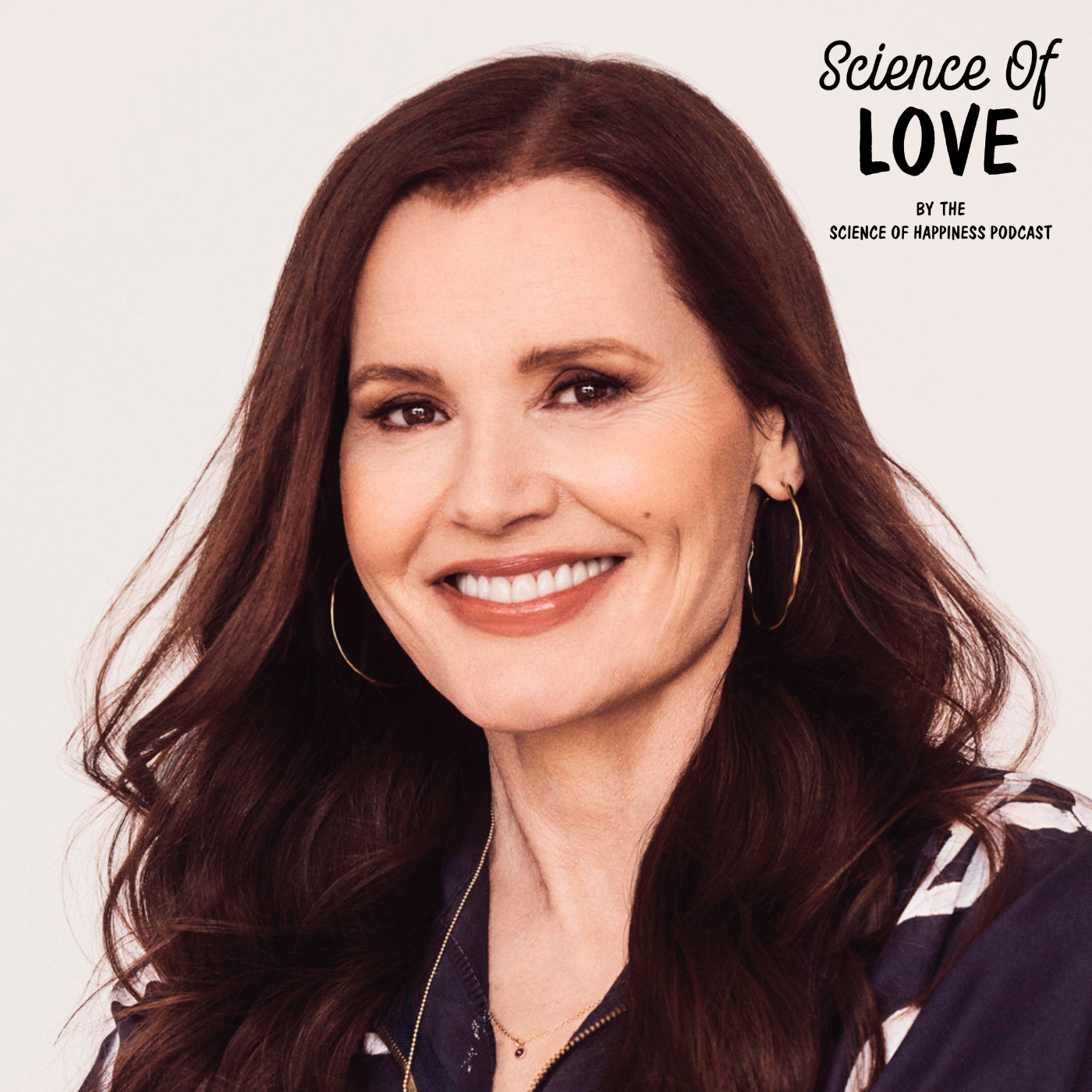

Guest host Geena Davis guides us through the research on love that stretches beyond romance and friendship, showing up in our bonds with objects, nature, grief, and the collective moments that connect us to something larger than ourselves. Summary: In this final episode of our 3-part series on researchers reveal how love expands our sense of self and strengthens our bond to humanity. We also explore why objects can feel meaningful, how love of nature can motivate care for the planet, he ways grief reshapes our capacity for connection, and our love of humanity. RELATED THE SCIENCE OF HAPPINESS EPISODES: The Science of Love Series: HTTPS://BIT.LY/THESCIENCEOFLOVE https://bit.ly/TheScienceofLove The Science of Love, with Geena Davis (Episode 1): HTTPS://TINYURL.COM/BFAVE5WD https://tinyurl.com/bfave5wd How 7 Days Can Transform Your Relationship: HTTPS://TINYURL.COM/BDH2EZHR https://tinyurl.com/bdh2ezhr RELATED HAPPINESS BREAKS: Visualizing Your Best Self in Relationships: HTTPS://TINYURL.COM/4797Z2VF https://tinyurl.com/4797z2vf A Guided Meditation on Embodied Love: HTTPS://TINYURL.COM/3DMPFAM6 https://tinyurl.com/3dmpfam6 A Meditation on Love and Interconnectedness: HTTPS://TINYURL.COM/YE6BAXV3 https://tinyurl.com/ye6baxv3 TODAY’S GUESTS: AARON AHUVIA is the most widely published and cited academic expert on non-interpersonal love. Learn more about Aaron Ahuvia here: HTTPS://THETHINGSWELOVE.COM/ABOUT-AARON/ https://thethingswelove.com/about-aaron/ JESSICA EISE is a social and environmental scientist and is an assistant professor in the Department of Environmental and Occupational Health with Indiana University School of Public Health-Bloomington. Learn more about Jessica Eise here: HTTPS://JESSICAEISE.COM/ https://jessicaeise.com/ YURIA CELIDWEN is an indigenous scholar of contemplative studies, and author of the new book, FLOURISHING KIN: INDIGENOUS FOUNDATIONS FOR COLLECTIVE WELL-BEING https://www.soundstrue.com/products/flourishing-kin?srsltid=AfmBOoqkuMiNsQ4S0g-V-juqEJLCyY6WWHcpTmqZGb4SFwryAGnDxJa9. Learn more about Yuria Celidwen here: HTTPS://WWW.YURIACELIDWEN.COM/ https://www.yuriacelidwen.com/#about MARY-FRANCES O'CONNOR is a psychologist and professor at the University of Arizona, where she directs the Grief, Loss, and Social Stress Lab. Learn more about Mary-Frances O’connor here: HTTPS://MARYFRANCESOCONNOR.ORG/ https://maryfrancesoconnor.org/ SHIRA GABRIEL is a Professor of Psychology at SUNY, University at Buffalo. Learn more about Shira Gabriel here: HTTPS://TINYURL.COM/2VVAV8XJ https://tinyurl.com/2vvav8xj Message us or leave a comment on Instagram @SCIENCEOFHAPPINESSPOD https://www.instagram.com/scienceofhappinesspod/. E-mail us at happinesspod@berkeley.edu or use the hashtag #happinesspod. Help us share The Science of Happiness! Leave us a 5-star review on Apple Podcasts or share this link with someone who might like the show: HTTPS://TINYURL.COM/2P9H5AAP https://tinyurl.com/2p9h5aap HTTPS://TINYURL.COM/22D5NUYR https://tinyurl.com/22d5nuyr


Guest host Geena Davis helps us explore how the love we feel —for our partners, friends, family, even our four legged companions—shapes our brains, bodies, and lives. Summary: On this episode of with Geena Davis, we delve into the many forms of love, and experts share research on how small daily actions, physical touch, and emotional attentiveness strengthen relationships, while evolutionary and neuroscience studies reveal why these bonds matter. We also explore practical strategies for cultivating deeper connections and understanding the biological and psychological roots of love. RELATED THE SCIENCE OF HAPPINESS EPISODES: The Science of Love Series: HTTPS://BIT.LY/THESCIENCEOFLOVE https://bit.ly/TheScienceofLove The Science of Love, with Geena Davis (Episode 1): HTTPS://TINYURL.COM/BFAVE5WD https://tinyurl.com/bfave5wd How 7 Days Can Transform Your Relationship: HTTPS://TINYURL.COM/BDH2EZHR https://tinyurl.com/bdh2ezhr TODAY’S GUESTS: DANIEL LEVITIN is a neuroscientist, musician, and bestselling author of the books, MUSIC AS MEDICINE: HOW WE CAN HARNESS ITS THERAPEUTIC POWER https://www.amazon.com/Music-Medicine-Harness-Therapeutic-Power-ebook/dp/B0D2KXL5J7 and I HEARD THERE WAS A SECRET CHORD: MUSIC AS MEDICINE https://wwnorton.com/books/i-heard-there-was-a-secret-chord. Follow Daniel Levitin on IG: HTTPS://WWW.INSTAGRAM.COM/DANIELLEVITINOFFICIAL https://www.instagram.com/daniellevitinofficial JOHN GOTTMAN is a psychologist and the co-founder of The Gottman Institute. JULIE GOTTMAN is a clinical psychologist and co-founder of The Gottman Institute and President of The Gottman Institute and co-founder of Affective Software, Inc. Learn more about John and Julie Gottman here: HTTPS://WWW.GOTTMAN.COM/ https://www.gottman.com/ JUSTIN GARCIA is an evolutionary biologist and international authority on the science of sex and relationships. Learn more about Justin Garcia here: HTTPS://TINYURL.COM/2C39CS6R https://tinyurl.com/2c39cs6r ANNA MACHIN is a British evolutionary anthropologist at the Department of Experimental Psychology at Oxford University, England and author of the book WHY WE LOVE: THE DEFINITIVE GUIDE TO OUR MOST FUNDAMENTAL NEED https://annamachin.com/books/. Learn more about Anna Machin here: HTTPS://ANNAMACHIN.COM/ https://annamachin.com/ MARISA G. FRANCO is a psychologist and professor at The University of Maryland and author of the book “PLATONIC: HOW THE SCIENCE OF ATTACHMENT CAN HELP YOU MAKE – AND KEEP – FRIENDS https://drmarisagfranco.com/platonic-the-book/.” Learn more about Marisa G. Franco here: HTTPS://DRMARISAGFRANCO.COM/ https://drmarisagfranco.com/ Message us or leave a comment on Instagram @SCIENCEOFHAPPINESSPOD https://www.instagram.com/scienceofhappinesspod/. E-mail us at happinesspod@berkeley.edu or use the hashtag #happinesspod. Help us share The Science of Happiness! Leave us a 5-star review on Apple Podcasts or share this link with someone who might like the show: HTTPS://TINYURL.COM/2P9H5AAP https://tinyurl.com/2p9h5aap https://tinyurl.com/4b52azja


In a culture that often reduces love to romance, we explore the science of love across the lifespan—revealing how our bonds with parents, friends, partners, and communities shape our health, happiness, and survival. Summary: Love is commonly understood as a feeling, yet scientific research increasingly points to its role as a core biological drive. In this episode of The , we explore how love is expressed through caregiving, friendship, romantic attachment, and shared experience, and how these connections leave measurable effects on the brain, body, and even the microbiome. RELATED THE SCIENCE OF HAPPINESS EPISODES: The Science of Love Series: HTTPS://BIT.LY/THESCIENCEOFLOVE https://bit.ly/TheScienceofLove 36 Questions to Spark Love and Connection: HTTPS://TINYURL.COM/KTCPZ78U https://tinyurl.com/ktcpz78u How 7 Days Can Transform Your Relationship: HTTPS://TINYURL.COM/BDH2EZHR https://tinyurl.com/bdh2ezhr TODAY’S GUESTS: ANN DRUYAN is an author, activist, and documentary producer. Learn more about Ann Druyan’s work here: HTTPS://TINYURL.COM/5N8CRKEV https://tinyurl.com/5n8crkev DANIEL LEVITIN is a neuroscientist, musician, and bestselling author. Follow Daniel Levitin on IG: HTTPS://WWW.INSTAGRAM.COM/DANIELLEVITINOFFICIAL https://www.instagram.com/daniellevitinofficial JESSICA EISE is a social and environmental scientist and is an assistant professor of social and environmental challenges with Indiana University School of Public Health-Bloomington. Learn more about Jessica Elise here: HTTPS://JESSICAEISE.COM/ https://jessicaeise.com/ ANNA MACHIN is an evolutionary anthropologist who studies the evolution of love. Learn more about Anna Machin here: HTTPS://ANNAMACHIN.COM/ https://annamachin.com/ FRANCESCO BEGHINI is a computational biologist at Yale University. Learn more about Francesco Beghini here: HTTPS://TINYURL.COM/KNM4DU4M https://tinyurl.com/knm4du4m ILANA BRITO is a biomedical engineering professor at Cornell University. Learn more about Ilana Brito here: HTTPS://TINYURL.COM/MTNHW3YD https://tinyurl.com/mtnhw3yd CONSTANCE BAINBRIDGE is a Communication PhD student at UCLA. Learn more about Constance Bainbridge here: HTTP://CONSTANCEBAINBRIDGE.COM/ http://constancebainbridge.com/ SANDRA LANGESLAG is a cognitive and biological psychologist who studies romantic love. Learn more about Sandra Langeslag here: HTTPS://TINYURL.COM/523WC9WX https://tinyurl.com/523wc9wx Message us or leave a comment on Instagram @SCIENCEOFHAPPINESSPOD https://www.instagram.com/scienceofhappinesspod/. E-mail us at happinesspod@berkeley.edu or use the hashtag #happinesspod. Help us share The Science of Happiness! Leave us a 5-star review on Apple Podcasts or share this link with someone who might like the show: HTTPS://TINYURL.COM/2P9H5AAP https://tinyurl.com/2p9h5aap https://tinyurl.com/bfave5wd
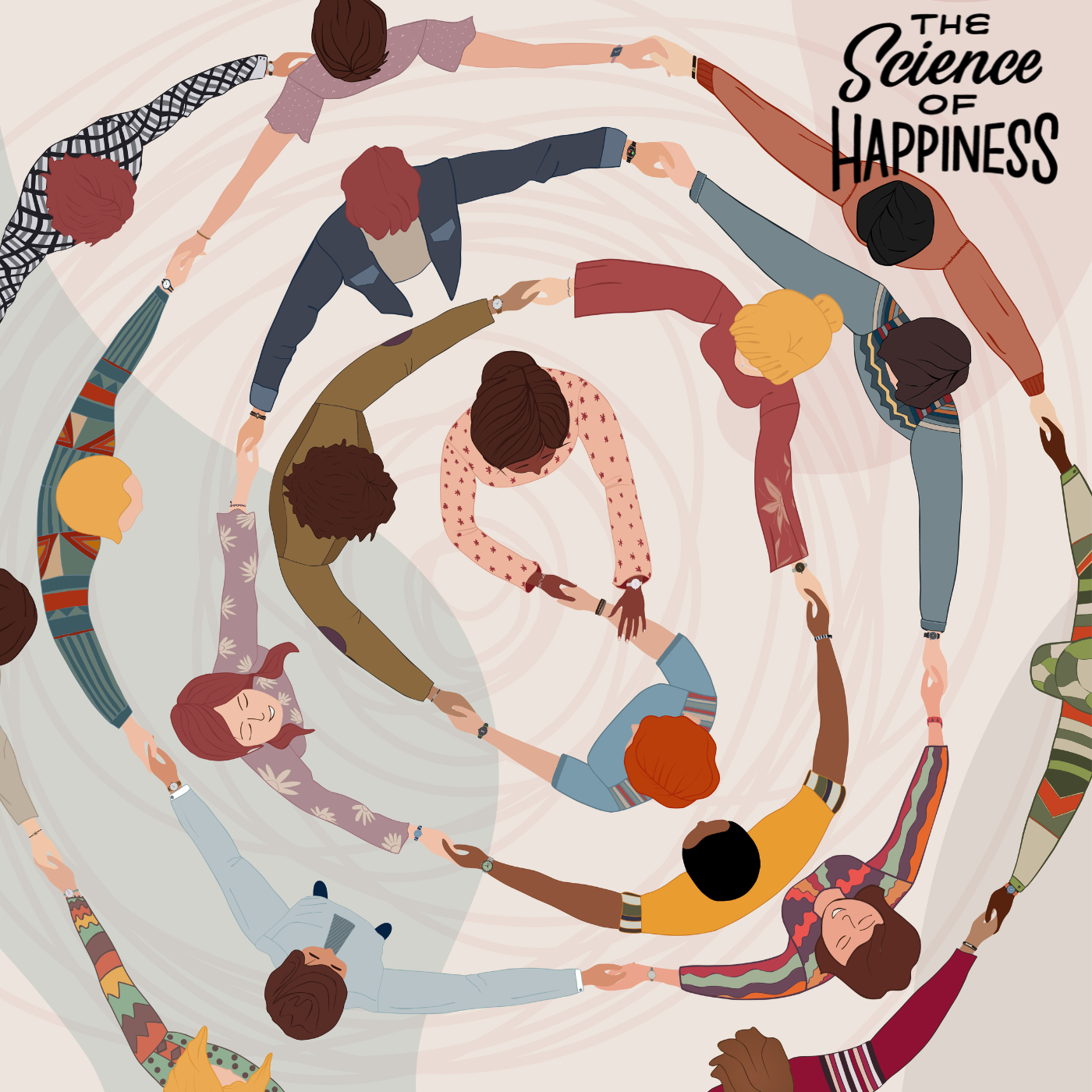

Discover what happens to our well-being when we respond to suffering with compassion, collective action, and why choosing to care can help us hold on to our shared humanity. Summary: In the face of widespread suffering, many of us struggle with how to respond without becoming overwhelmed or numb. Drawing on research and real-world experience, this episode of examines the psychological impact of bearing witness, acting in alignment with our values, and showing up for others—even when it’s hard. We look at how compassion, agency, and a sense of common humanity can both strengthen resilience and carry real emotional costs, and why people continue to act anyway. https://tinyurl.com/happyhappysurvey HOW TO DO THIS PRACTICE: __ PAUSE AND NAME WHAT’S HAPPENING: Take a moment to notice what you’re feeling as you witness suffering or injustice—anger, grief, numbness, confusion. Naming the emotion helps calm the stress response and keeps you from shutting down or looking away. RECONNECT WITH COMMON HUMANITY: Remind yourself: there are no “good people” and “bad people”—there are people. CLARIFY YOUR VALUES ON PAPER: Write down one to three values that matter most to you right now (for example: compassion, integrity, dignity, justice). Studies show that writing values down lowers stress and makes it more likely you’ll act in alignment with them. GENTLY ASK YOURSELF: Consider what access, safety, or influence you may have, and what constraints you face. Acting with integrity looks different for everyone, and this step helps you choose a response that is both values-aligned and realistic. CHOOSE A SAFE, DOABLE ACTION: Action doesn’t have to be loud or risky. It might be writing, speaking up in a meeting, supporting someone directly, or adding your voice to a collective effort. Even small actions strengthen agency and social connection. REFLECT AND RECONNECT: After you act, check in with yourself. Notice any sense of alignment, relief, meaning, grief, or fear. Acting with integrity won’t erase pain, but it helps protect mental health and shapes who we become over time. __ TODAY’S GUESTS: DR. FEROZE SIDHWA is a trauma, and critical care surgeon in California. He has also worked as a physician in Haiti, Ukraine and Palestine. Learn more about Dr. Feroze Sidhwa here: HTTPS://WWW.FEROZESIDHWA.ORG/ https://www.ferozesidhwa.org/ DR. AKIVA LEBOWITZ is a physician and critical care specialist. Learn more about Dr. Akiva Lebowitz here: HTTPS://AKIVAFORBROOKLINE.COM/ https://akivaforbrookline.com/ DR. SUNITA SAH is a social scientist, author, and psychologist. Learn more about Dr. Sunita Sah here: HTTPS://WWW.SUNITASAH.COM/ https://www.sunitasah.com/ Tell us about your experience with this practice. Email us at happinesspod@berkeley.edu or follow on Instagram @HAPPINESSPOD https://www.instagram.com/scienceofhappinesspod/#. Help us share The Science of Happiness! Leave us a 5-star review on Apple Podcasts and share this link with someone who might like the show: HTTPS://TINYURL.COM/2P9H5AAP https://tinyurl.com/2p9h5aap Transcription: HTTPS://TINYURL.COM/48WZ2VRU https://tinyurl.com/48wz2vru
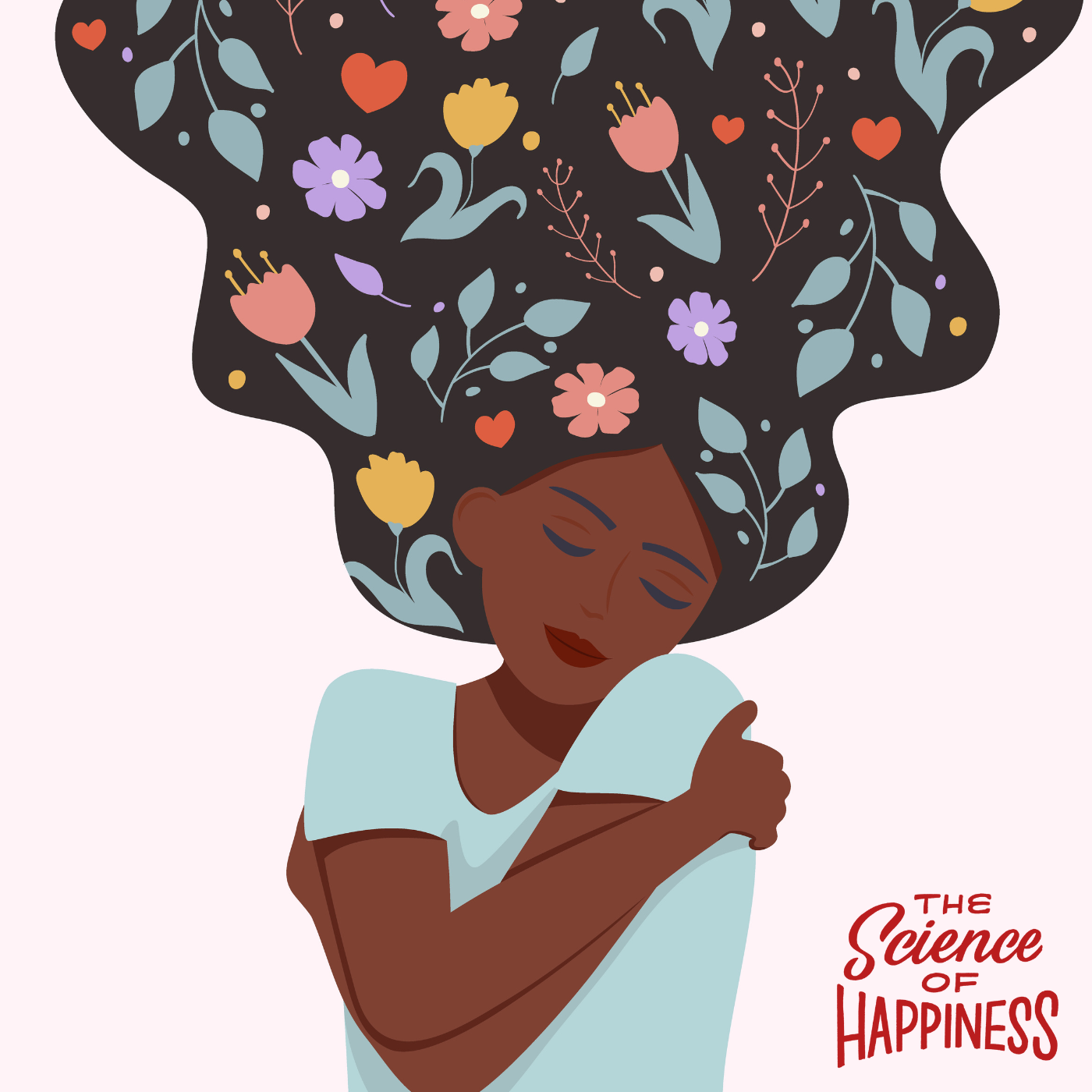

Psychologist and stress expert Elissa Epel leads us in a gentle, science-backed practice to calm our nervous systems and meet uncertainty with greater ease and acceptance. https://wwnorton.com/books/9781324019206 https://tinyurl.com/happyhappysurvey HOW TO DO THIS PRACTICE: __ SETTLE IN: Find a quiet, comfortable place to sit. Close your eyes or soften your gaze, and begin breathing in through your nose with long, slow exhales through pursed lips. SCAN YOUR BODY: Gently move your attention from the top of your head down to your toes, noticing areas of tension with a kind, curious awareness. BREATHE INTO TENSION: Wherever you feel tightness, breathe into that area and soften it with each exhale, allowing your nervous system to relax just a little more. NOTICE UNCERTAINTY: Turn your attention to your thoughts and feelings. Ask yourself what feels uncertain right now, and name any emotions that arise without trying to change them. RELEASE CONTROL: Notice where you may be holding expectations or trying to control the future, and gently practice letting go, reminding yourself that uncertainty is part of life. REST IN THE PRESENT: Lean back, relax your shoulders, and focus on the safety and ease of this moment, repeating a phrase like “Things are exactly as they are right now.” __ TODAY’S HAPPINESS BREAK GUIDE: ELISSA EPEL, PH.D, is a Professor and Vice Chair in the Department of Psychiatry & Behavioral Sciences, at University of California, San Francisco. Learn more about Elissa Epel here: HTTPS://WWW.ELISSAEPEL.COM/ https://www.elissaepel.com/ RELATED HAPPINESS BREAK EPISODES: Loving Kindness Meditation: HTTPS://TINYURL.COM/2KR4FJZ5 https://tinyurl.com/2kr4fjz5 Embodying Resilience: HTTPS://TINYURL.COM/46383MHX https://tinyurl.com/46383mhx A Meditation for When You Feel Uneasy: HTTPS://TINYURL.COM/4UTRKYH5 https://tinyurl.com/4utrkyh5 Follow us on Instagram: @SCIENCEOFHAPPINESSPOD https://www.instagram.com/scienceofhappinesspod/ We’d love to hear about your experience with this practice! Share your thoughts at happinesspod@berkeley.edu or use the hashtag #happinesspod. Find us on Apple Podcasts: HTTPS://TINYURL.COM/2P9H5AAP https://tinyurl.com/2p9h5aap Help us share ! Leave a 5-star review and share this link: HTTPS://TINYURL.COM/2P9H5AAP https://tinyurl.com/2p9h5aap HTTPS://TINYURL.COM/2X4PE95J https://tinyurl.com/2x4pe95j
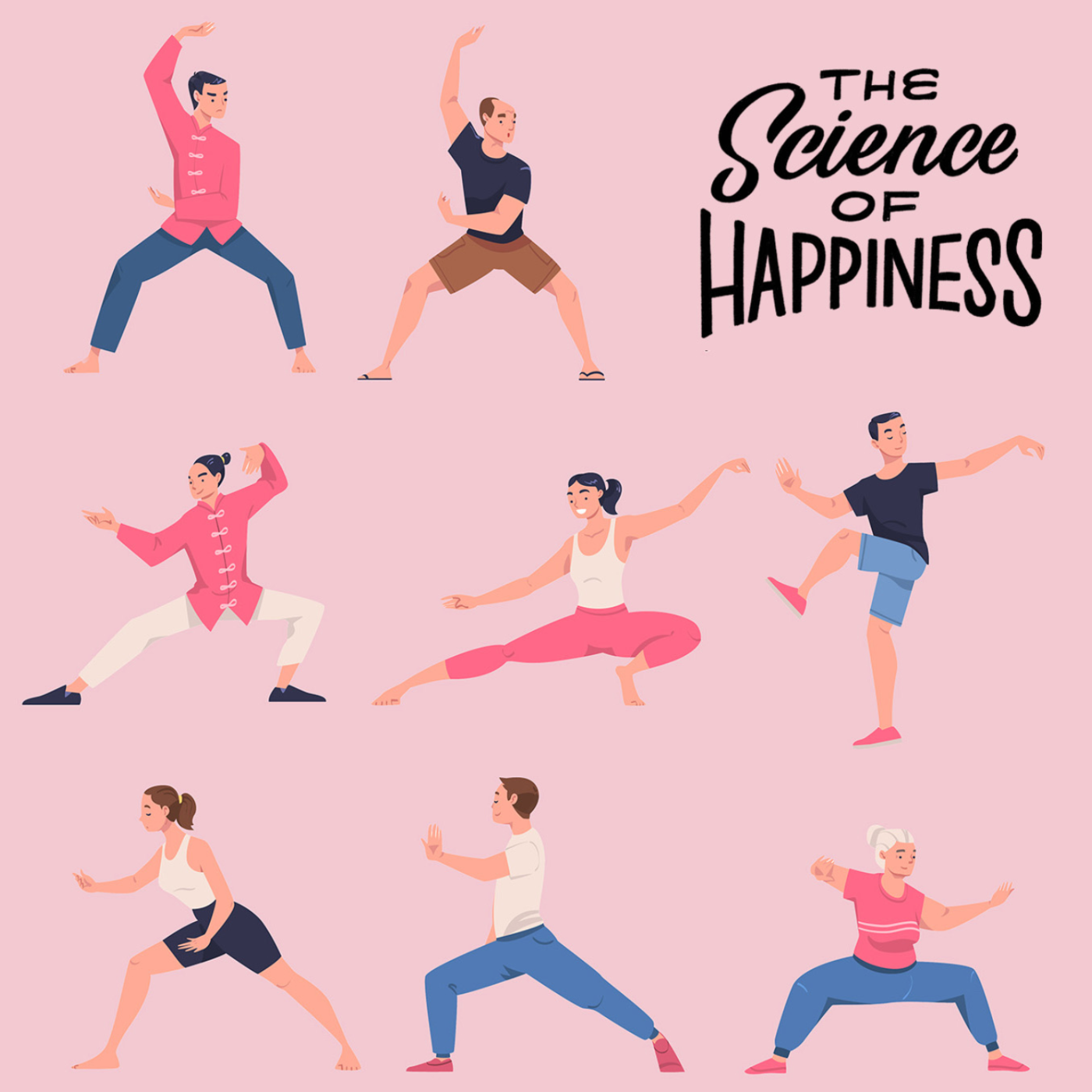

Studies show qigong can strengthen your body and mind, and reduce cortisol levels. We explore this Chinese meditative movement practice that dates back over 4,000 years. Summary: After a period of intense stress, loss, and physical disconnection, one guest turns to qigong—a gentle, meditative movement practice rooted in traditional Chinese medicine—to reconnect with their body and calm their nervous system. This episode of The Science of Happiness explores the growing scientific evidence behind qigong, revealing how mindful movement can support both physical health and psychological well-being. https://tinyurl.com/happyhappysurvey ONE WAY TO DO THIS PRACTICE: __ __ TODAY’S GUESTS: ACE BORAL is an Oakland-based chef. PETER WAYNE is an Associate Professor of Medicine, and serves as the Director for the Osher Center for Integrative Medicine, jointly based at Harvard Medical School and Brigham and Women’s Hospital. Learn more about Peter’s work: HTTPS://TINYURL.COM/342XNDNA https://tinyurl.com/342xndna RELATED THE SCIENCE OF HAPPINESS EPISODES: Breathe Away Anxiety (Cyclic Sighing): HTTPS://TINYURL.COM/3U7VSRR5 https://tinyurl.com/3u7vsrr5 The Science of Synchronized Movement: HTTPS://TINYURL.COM/N4BCRB5J https://tinyurl.com/n4bcrb5j Tell us about your experience with this practice. Email us at happinesspod@berkeley.edu or follow on Instagram @HAPPINESSPOD https://www.instagram.com/scienceofhappinesspod/#. Help us share The Science of Happiness! Leave us a 5-star review on Apple Podcasts and share this link with someone who might like the show: HTTPS://TINYURL.COM/2P9H5AAP https://tinyurl.com/2p9h5aap Transcription: HTTPS://TINYURL.COM/YYXNSFY9 https://tinyurl.com/yyxnsfy9
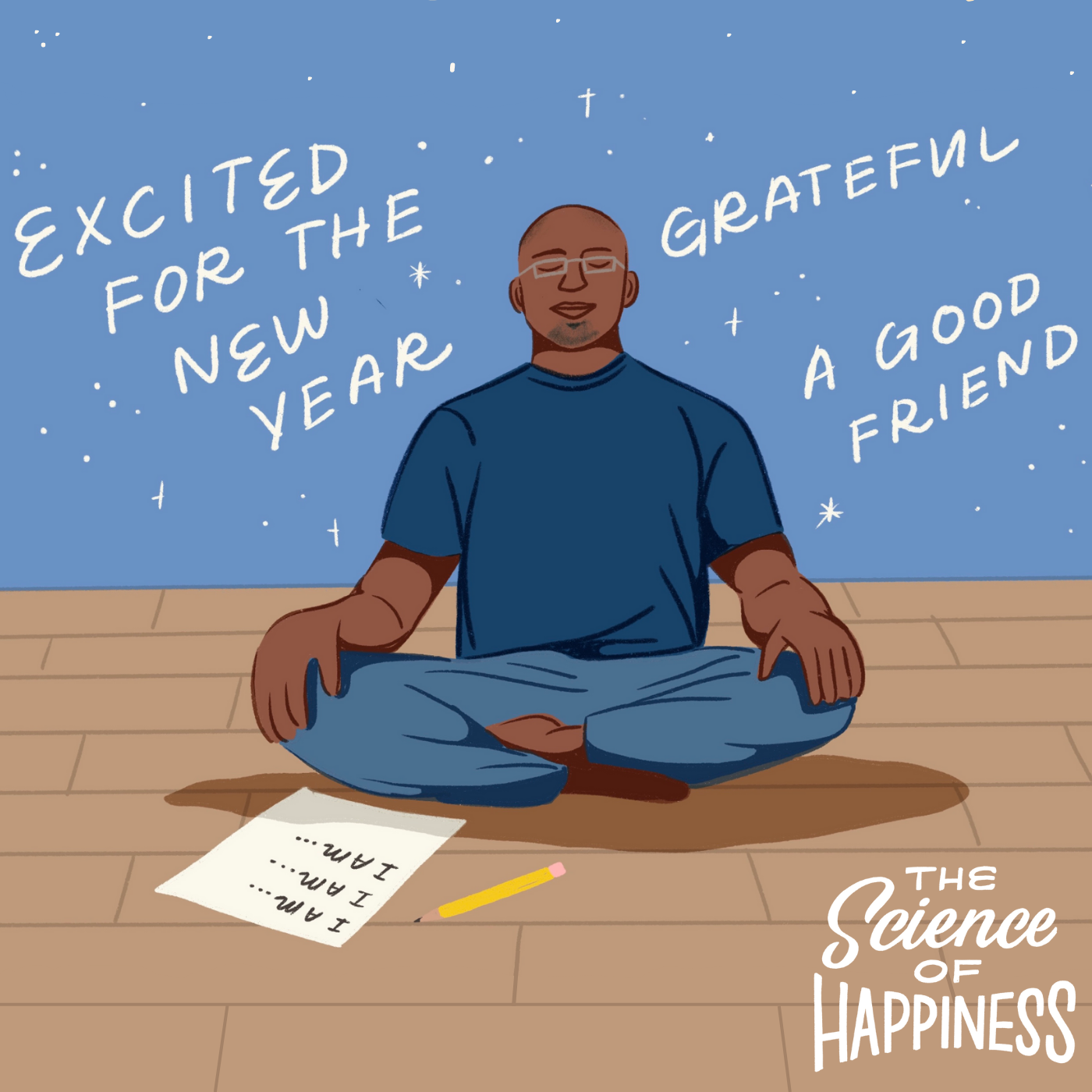

This New Year, affirm the wonderful qualities you already possess with this meditative writing practice with Chris Murchison called "I Am." HOW TO DO THIS PRACTICE: __ SETTLE YOUR BODY AND BREATH: Find a comfortable seat. Close your eyes or soften your gaze. Take a few slow, deep breaths. Feeling your belly and lungs expand. Bringing your attention into the present moment. NOTICE WHAT’S HERE: Briefly tune in to what’s moving through you right now: thoughts, emotions, sensations in your body, and the space around you. There’s nothing to change—just notice. BEGIN WITH “I AM…”: Open your eyes and place your pen at the top of the page. Write the words “I am…” and complete the sentence with whatever feels true at this moment. KEEP WRITING CONTINUOUSLY FOR ONE MINUTE: On each new line, write “I am…” again and complete it. Keep your pen moving for a full minute. Don’t edit, judge, or overthink. Just let the words come. PAUSE AND REFLECT: Put your pen down. Read what you’ve written. Notice where you started, how your responses shifted, and where you ended. Look for patterns, themes, or surprises. CARRY IT FORWARD: Take a few mindful breaths. Consider how this clearer sense of your present self might shape how you move into the next moment with more awareness and care. __ TODAY’S HAPPINESS BREAK GUIDE: CHRIS MURCHISON is an artist and meditation teacher. Check out Chris’s website: HTTPS://CHRISMURCHISON.COM/ https://chrismurchison.com/ Follow Chris on Instagram: HTTPS://TINYURL.COM/4NYJAHJ4 https://tinyurl.com/4nyjahj4 RELATED HAPPINESS BREAK EPISODES: The Healing Power of Your Own Touch: HTTPS://TINYURL.COM/Y4ZE59H8 https://tinyurl.com/y4ze59h8 A Self-Compassion Meditation For Burnout: HTTPS://TINYURL.COM/485Y3B4Y https://tinyurl.com/485y3b4y How to Be Your Own Best Friend: HTTPS://TINYURL.COM/Y5KBECEJ https://tinyurl.com/y5kbecej RELATED SCIENCE OF HAPPINESS EPISODES: How to Stick to Your Resolutions in 2024: HTTPS://TINYURL.COM/MUB9Z9Z4 https://tinyurl.com/mub9z9z4 How Holding Yourself Can Reduce Stress: HTTPS://TINYURL.COM/2HVHKWE6 https://tinyurl.com/2hvhkwe6 How To Show Up For Yourself: HTTPS://TINYURL.COM/56KTB9XC https://tinyurl.com/56ktb9xc Follow us on Instagram: @SCIENCEOFHAPPINESSPOD https://www.instagram.com/scienceofhappinesspod/ We’d love to hear about your experience with this practice! Share your thoughts at happinesspod@berkeley.edu or use the hashtag #happinesspod. Find us on Apple Podcasts: HTTPS://TINYURL.COM/2P9H5AAP https://tinyurl.com/2p9h5aap Help us share Happiness Break! Leave a 5-star review and share this link: HTTPS://TINYURL.COM/2P9H5AAP https://tinyurl.com/2p9h5aap https://tinyurl.com/2d595rz3
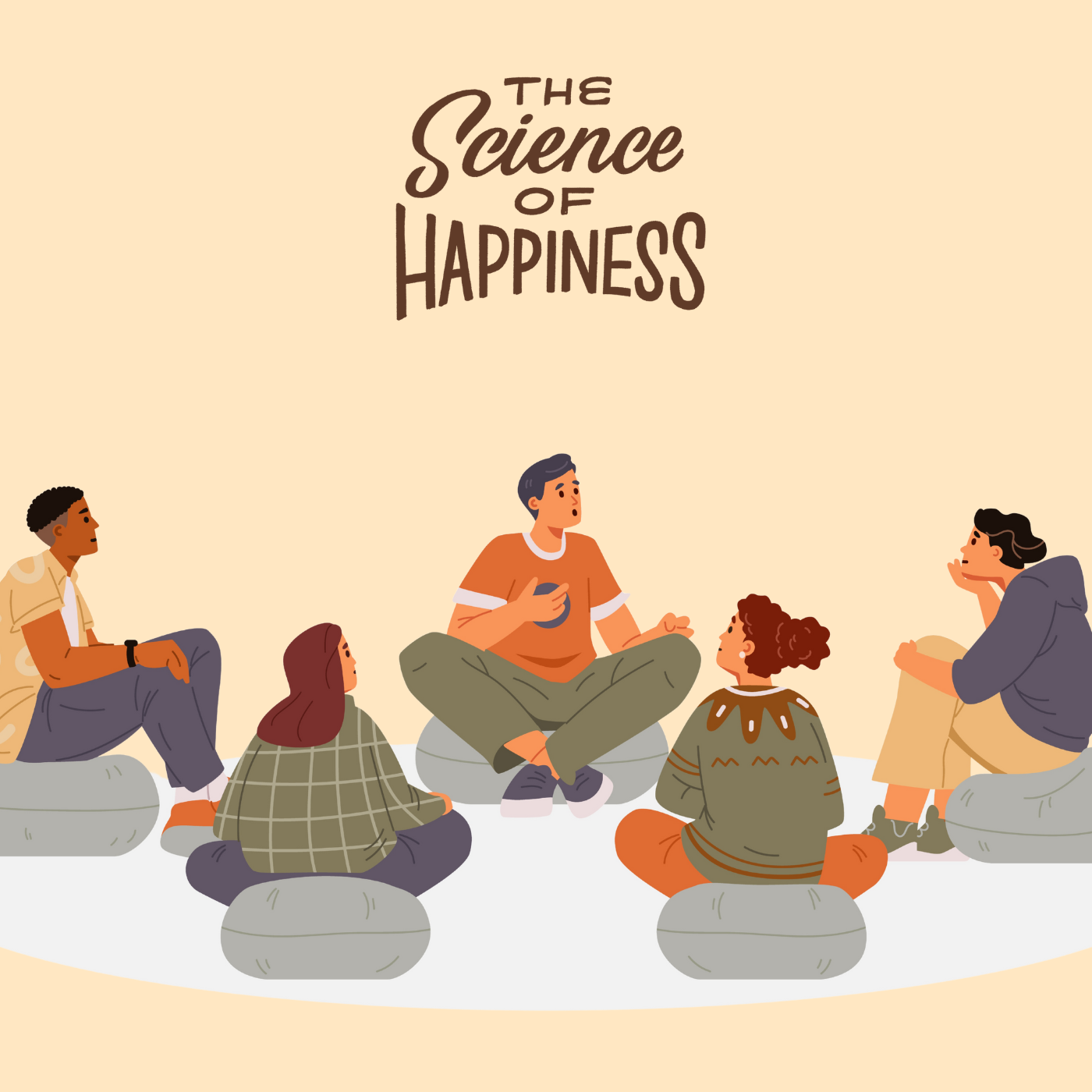

Learn how the stories we tell and hear shape our relationships, values, and sense of belonging. Summary: Storytelling is more than entertainment. It shapes how we think, feel, and relate to others. In this episode of The Science of Happiness, we dive into how immersive narratives calm stress, inspire reflection, and foster compassion across differences. We also explore how stories of resilience, joy, and tradition leave lasting impressions that influence our relationships and sense of self. HOW TO DO THIS PRACTICE: __ CHOOSE A MEANINGFUL STORY: Bring to mind a personal memory, family tradition, or moment that carries emotion, care, or learning. SETTLE THE BODY FIRST: Take a few slow breaths and notice your posture, helping your nervous system feel steady and present. RECALL SENSORY DETAILS: Gently remember what you saw, heard, smelled, or felt in the moment, letting the story come alive without forcing it. NOTICE WHAT MATTERS: As the story unfolds, pay attention to themes of connection, care, resilience, or joy that stand out to you. REFLECT ON ITS MEANING: Ask yourself what this story has shaped in you—how it influences your values, relationships, or sense of belonging. SHARE OR CARRY IT FORWARD: If it feels right, share the story with someone you trust, write it down, or hold it quietly as a reminder of connection and continuity. __ TODAY’S GUESTS: SAFA SULEIMAN is an elementary school teacher and author of the new children’s book . Learn more about Safa here: HTTPS://WWW.SAFASULEIMAN.COM/ https://www.safasuleiman.com/ MELANIE GREEN is a social psychologist at the University at Buffalo who has published widely on narrative persuasion and the power of storytelling. See more on Melanie’s work here: HTTPS://TINYURL.COM/E5FD8BU5 https://tinyurl.com/e5fd8bu5 RELATED THE SCIENCE OF HAPPINESS EPISODES: How Thinking About Your Ancestors Can Help You Thrive: HTTPS://TINYURL.COM/4U6VZS2W https://tinyurl.com/4u6vzs2w Are You Following Your Inner Compass: HTTPS://TINYURL.COM/Y2BH8VVJ https://tinyurl.com/y2bh8vvj How To Show Up For Yourself: HTTPS://TINYURL.COM/56KTB9XC https://tinyurl.com/56ktb9xc RELATED HAPPINESS BREAKS: A Meditation on Love and Interconnectedness: HTTPS://TINYURL.COM/YE6BAXV3 https://tinyurl.com/ye6baxv3 Our Deep Interconnectedness: HTTPS://TINYURL.COM/JTHXKPJD https://tinyurl.com/jthxkpjd Pause to Look at the Sky: HTTPS://TINYURL.COM/4JTTKBW3 https://tinyurl.com/4jttkbw3 Tell us about your experience with this practice. Email us at happinesspod@berkeley.edu or follow on Instagram @HAPPINESSPOD https://www.instagram.com/scienceofhappinesspod/#. Help us share The Science of Happiness! Leave us a 5-star review on Apple Podcasts and share this link with someone who might like the show: HTTPS://TINYURL.COM/2P9H5AAP https://tinyurl.com/2p9h5aap Transcription: HTTPS://TINYURL.COM/2TKVDYR8 https://tinyurl.com/2tkvdyr8
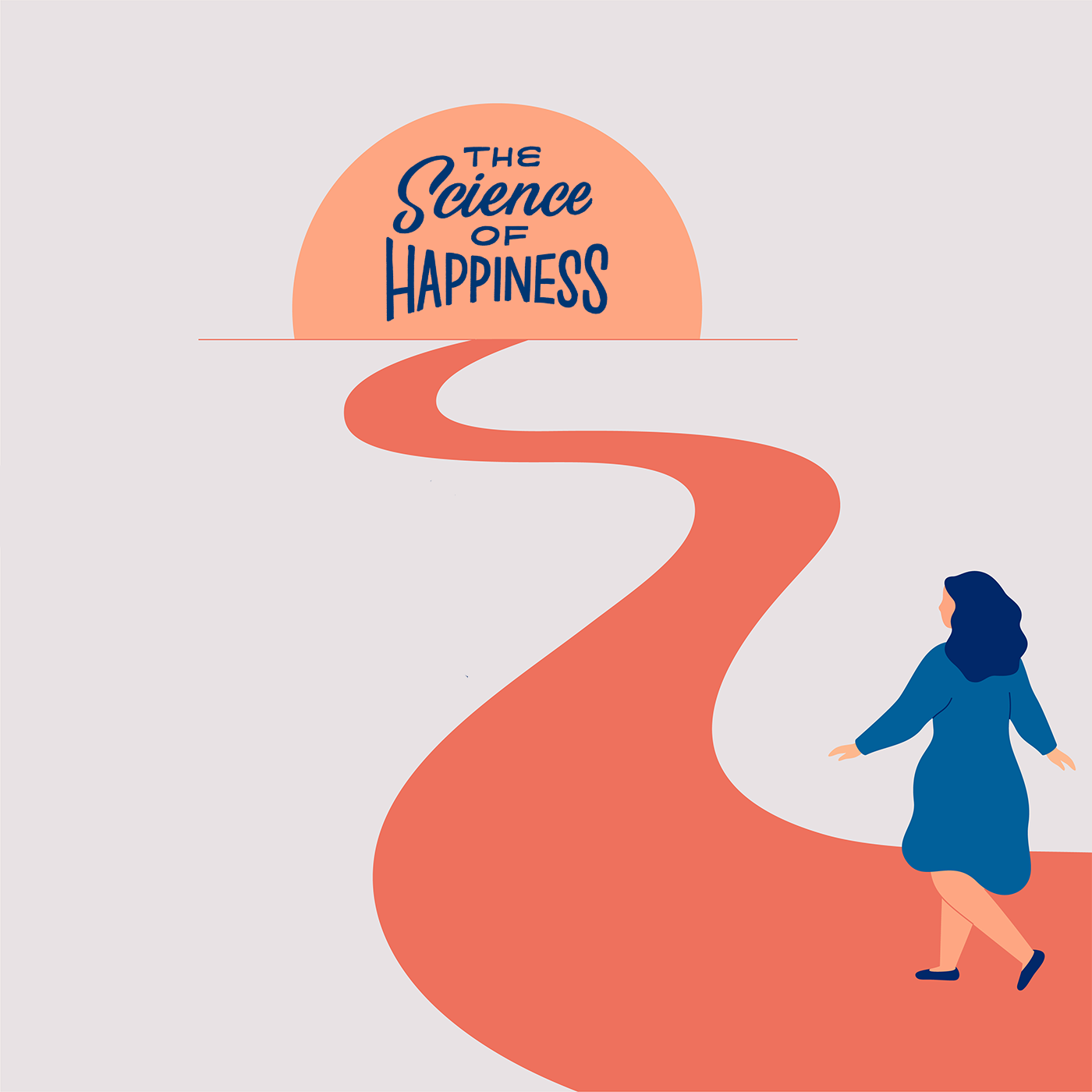

También tenemos esta meditación en Español. Transcription: HTTPS://TINYURL.COM/4RJMAMBM https://tinyurl.com/4rjmambm


Take a few minutes to reflect on someone who inspires you, and how you can embody the values you admire in them. You can also listen to this episode in Spanish here: https://tinyurl.com/4rjmambm HOW TO DO THIS PRACTICE: __ FIND A QUIET MOMENT AND SETTLE YOUR BODY: Sit or stand somewhere you feel safe and comfortable. Take a few slow breaths and let your body soften, releasing the noise of the day. BRING TO MIND SOMEONE WHO EMBODIES “MORAL BEAUTY”: Think of a person whose kindness, courage, humility, or integrity has genuinely inspired you. Choose one specific moment when their character moved you. VISUALIZE AN ACT THAT INSPIRED YOU: Recall exactly what the person did. Picture the scene, their actions, their choices. Notice why this moment stood out as meaningful or brave or good. NOTICE HOW YOUR BODY RESPONDS: As you hold this image, tune into your body: warmth, openness, tenderness, or even tears. Allow yourself to feel the emotional impact of their moral beauty. REFLECT ON WHY THIS MATTERS TO YOU: Ask yourself: CHOOSE ONE SMALL ALIGNED ACTION FOR TODAY: Identify one thing you can do—big or small—that expresses the value or purpose this person embodies. Carry that intention with you into the rest of your day. __ TODAY’S HAPPINESS BREAK GUIDE: DIANA PARRAis professor at Washington University in St. Louis, Missouri. She is also a registered mindfulness and yoga teacher who focuses on sharing these practices with the Latino immigrant community in St Louis. Learn more about Diana Parra’s work: HTTPS://TINYURL.COM/4ACC7NSV https://tinyurl.com/4acc7nsv RELATED HAPPINESS BREAK EPISODES: Loving Kindness Meditation: HTTPS://TINYURL.COM/2KR4FJZ5 https://tinyurl.com/2kr4fjz5 How to Do Good for the Environment (And Yourself): HTTPS://TINYURL.COM/5B26ZWKX https://tinyurl.com/5b26zwkx RELATED SCIENCE OF HAPPINESS EPISODES: Why We Should Seek Beauty: HTTPS://TINYURL.COM/YN7RY59J https://tinyurl.com/yn7ry59j https://tinyurl.com/happyhappysurvey Follow us on Instagram: @SCIENCEOFHAPPINESSPOD https://www.instagram.com/scienceofhappinesspod/ We’d love to hear about your experience with this practice! Share your thoughts at happinesspod@berkeley.edu or use the hashtag #happinesspod. Find us on Apple Podcasts: HTTPS://TINYURL.COM/2P9H5AAP https://tinyurl.com/2p9h5aap Help us share Happiness Break! Leave a 5-star review and share this link: HTTPS://TINYURL.COM/2P9H5AAP https://tinyurl.com/2p9h5aap https://tinyurl.com/4945b59w
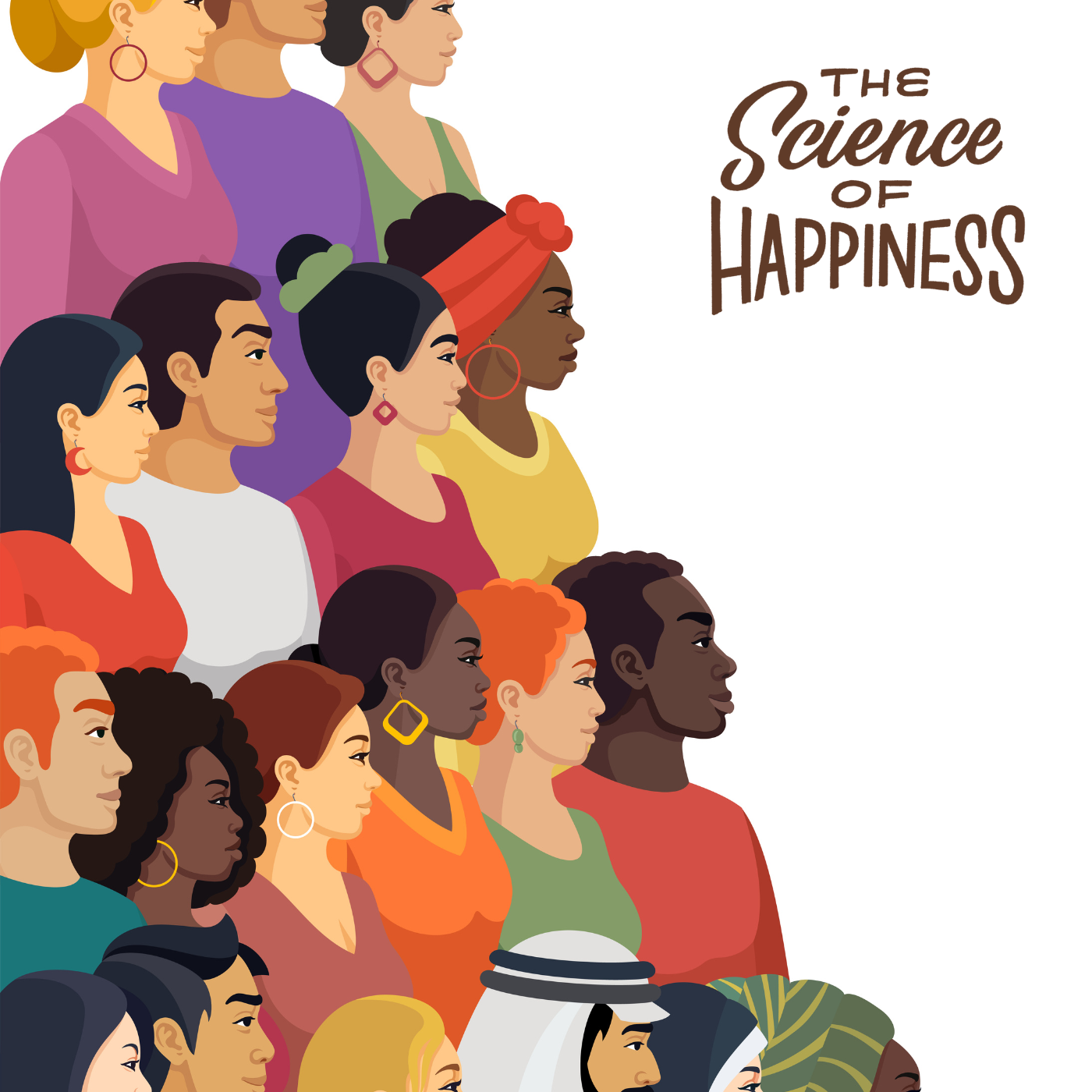

Explore how students are using simple mindful breathing practices to navigate stress, stay grounded, and support their classmates. Summary: Classrooms often are confronted with difficult topics that can leave students overwhelmed and anxious. In this episode of The Science of Happiness, we highlight how college student Evelyn Mata brought calm to herself and peers during an Immigration Studies class through simple collective breathing practices. HOW TO DO BOX BREATHING: __ SIT COMFORTABLY: Find a quiet spot and focus on your breath, keeping a relaxed posture. INHALE (4 COUNTS): Breathe in slowly through your nose, letting the air fill your belly and chest. Keep the pace steady, not strained for a count of four. HOLD (4 COUNTS): Pause gently at the top of the inhale. This isn’t a tense hold, just a moment of stillness to let the body register calm. Hold your breath for four slow counts. EXHALE (4 COUNTS): Release the breath through your nose or mouth in a smooth, even flow. Imagine tension leaving the body as the breath moves out for a count of four, emptying your lungs. HOLD (4 COUNTS): Let yourself rest briefly in the empty space before the next inhale. This completes the “box.” REPEAT: Continue this cycle for several minutes, or for 3-4 rounds, until you feel calmer. Stop sooner if you feel lightheaded; return to natural breathing when you’re done. __ TODAY’S GUESTS: EVELYN MATA is an undergraduate student at UC Berkeley, studying Psychology and Public Policy. DR. PABLO GONZALEZ is a professor in the Ethnic Studies department at UC Berkeley. Learn more about Pablo here: HTTPS://ETHNICSTUDIES.BERKELEY.EDU/PEOPLE/PABLO-GONZALEZ https://ethnicstudies.berkeley.edu/people/pablo-gonzalez RELATED THE SCIENCE OF HAPPINESS EPISODES: Breathe Away Anxiety (Cyclic Sighing): HTTPS://TINYURL.COM/3U7VSRR5 https://tinyurl.com/3u7vsrr5 How To Tune Out The Noise: HTTPS://TINYURL.COM/4HHEKJUH https://tinyurl.com/4hhekjuh What To Do When Stress Takes Over: HTTPS://TINYURL.COM/MSKVFMV4 https://tinyurl.com/mskvfmv4 RELATED HAPPINESS BREAKS: Make Uncertainty Part of the Process: HTTPS://TINYURL.COM/234U5DS7 https://tinyurl.com/234u5ds7 A Meditation for When You Feel Uneasy: HTTPS://TINYURL.COM/4X27UT3P https://tinyurl.com/4x27ut3p A Mindful Breath Meditation, With Dacher Keltner: HTTPS://TINYURL.COM/MR9D22KR https://tinyurl.com/mr9d22kr Tell us about your experience with this practice. Email us at happinesspod@berkeley.edu or follow on Instagram @HAPPINESSPOD https://www.instagram.com/scienceofhappinesspod/#. Help us share The Science of Happiness! Leave us a 5-star review on Apple Podcasts and share this link with someone who might like the show: HTTPS://TINYURL.COM/2P9H5AAP https://tinyurl.com/2p9h5aap Transcription: HTTPS://TINYURL.COM/4WZ4VBC3 https://tinyurl.com/4wz4vbc3
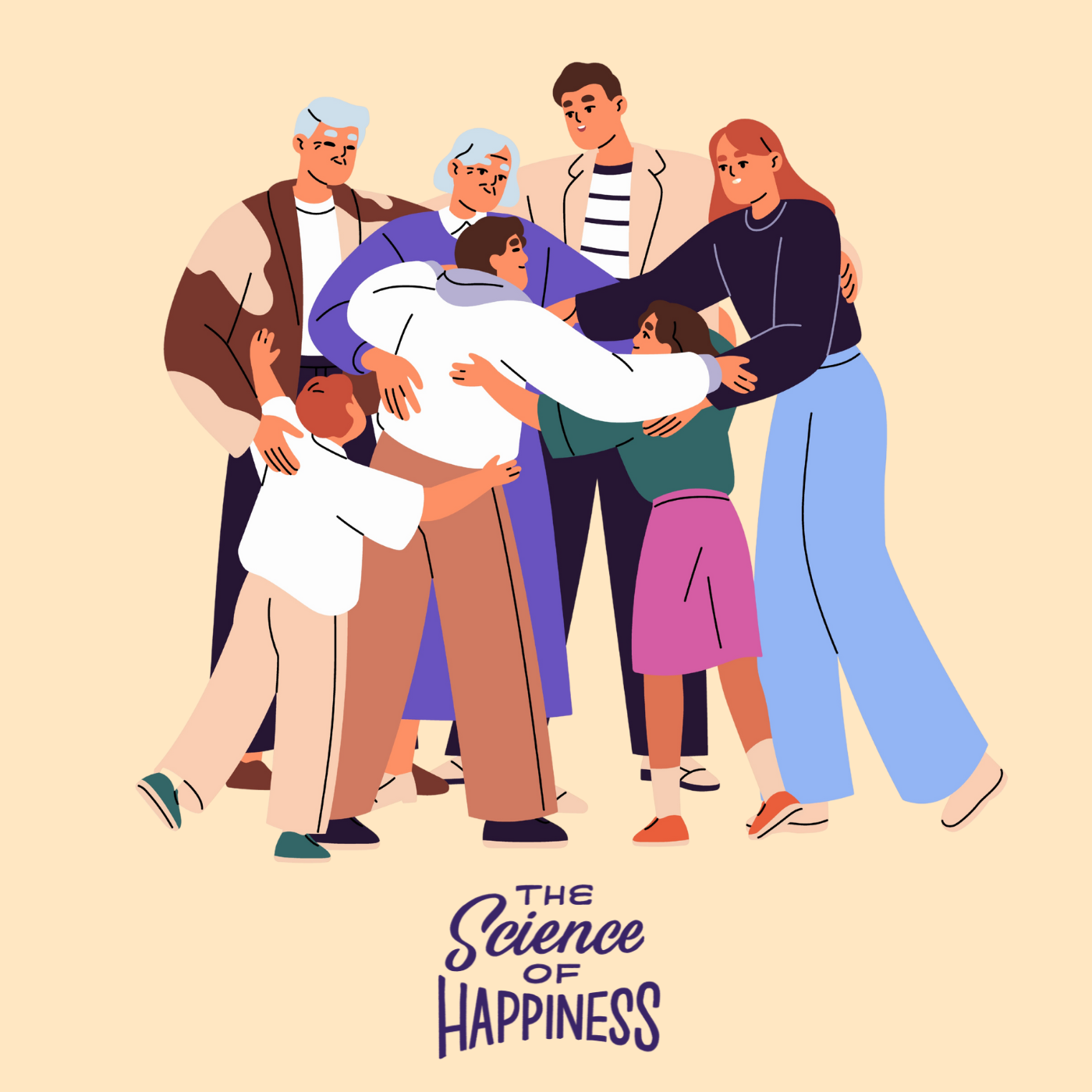

Through a gentle ancestral meditation, discover how grounding in your roots can open the door to healing, meaning, and a deeper sense of belonging. HOW TO DO THIS PRACTICE: __ SETTLE INTO YOUR BODY: Notice whether you’re sitting, standing, or walking, and gently bring your attention to the natural rhythm of your breath. GROUND YOURSELF THROUGH THE EARTH: Feel the weight of your body supported by the ground beneath you, and let any thoughts drift by like passing clouds. SENSE THE ANCESTORS IN NATURE: Expand your awareness to the sky, the earth, trees, and mountains, imagining them as ancestors who have been here long before you. CONNECT WITH YOUR HEARTBEAT: Place a hand on your heart if it feels comfortable, noticing the steady drumbeat within you—a rhythm shared across generations. CULTIVATE COMPASSION FOR YOUR LINEAGE: Envision compassion as a color or texture in your chest and let it gently radiate outward, offering it to your ancestors and to yourself. OFFER A WISH FOR HEALING: Bring to mind a simple wish for the easing of suffering—your own or others’—and breathe it through your body from sky to earth before slowly opening your eyes. __ TODAY’S HAPPINESS BREAK GUIDE: SARÁ KING is a neuroscientist, medical anthropologist and educator at UC San Diego. Learn more about Sará King here: HTTPS://WWW.EOMEGA.ORG/PEOPLE/SARA-KING https://www.eomega.org/people/sara-king RELATED HAPPINESS BREAK EPISODES: Where Did You Come From: HTTPS://TINYURL.COM/2Y9UYJJ6 https://tinyurl.com/2y9uyjj6 How To Tune Into Water’s Restorative Power: HTTPS://TINYURL.COM/2K6YBZRS https://tinyurl.com/2k6ybzrs A Meditation to Connect With Your Roots: HTTPS://TINYURL.COM/YCY9XAZC https://tinyurl.com/ycy9xazc RELATED SCIENCE OF HAPPINESS EPISODES: Are You Following Your Inner Compass: HTTPS://TINYURL.COM/Y2BH8VVJ https://tinyurl.com/y2bh8vvj How Water Heals: HTTPS://TINYURL.COM/UTUHRNH3 https://tinyurl.com/utuhrnh3 Who’s Always There for You: HTTPS://TINYURL.COM/YT3EJJ6W https://tinyurl.com/yt3ejj6w https://tinyurl.com/happyhappysurvey Follow us on Instagram: @SCIENCEOFHAPPINESSPOD https://www.instagram.com/scienceofhappinesspod/ We’d love to hear about your experience with this practice! Share your thoughts at happinesspod@berkeley.edu or use the hashtag #happinesspod. Find us on Apple Podcasts: HTTPS://TINYURL.COM/2P9H5AAP https://tinyurl.com/2p9h5aap Help us share Happiness Break! Leave a 5-star review and share this link: HTTPS://TINYURL.COM/2P9H5AAP https://tinyurl.com/2p9h5aap Transcription: https://tinyurl.com/mrsnwvrm
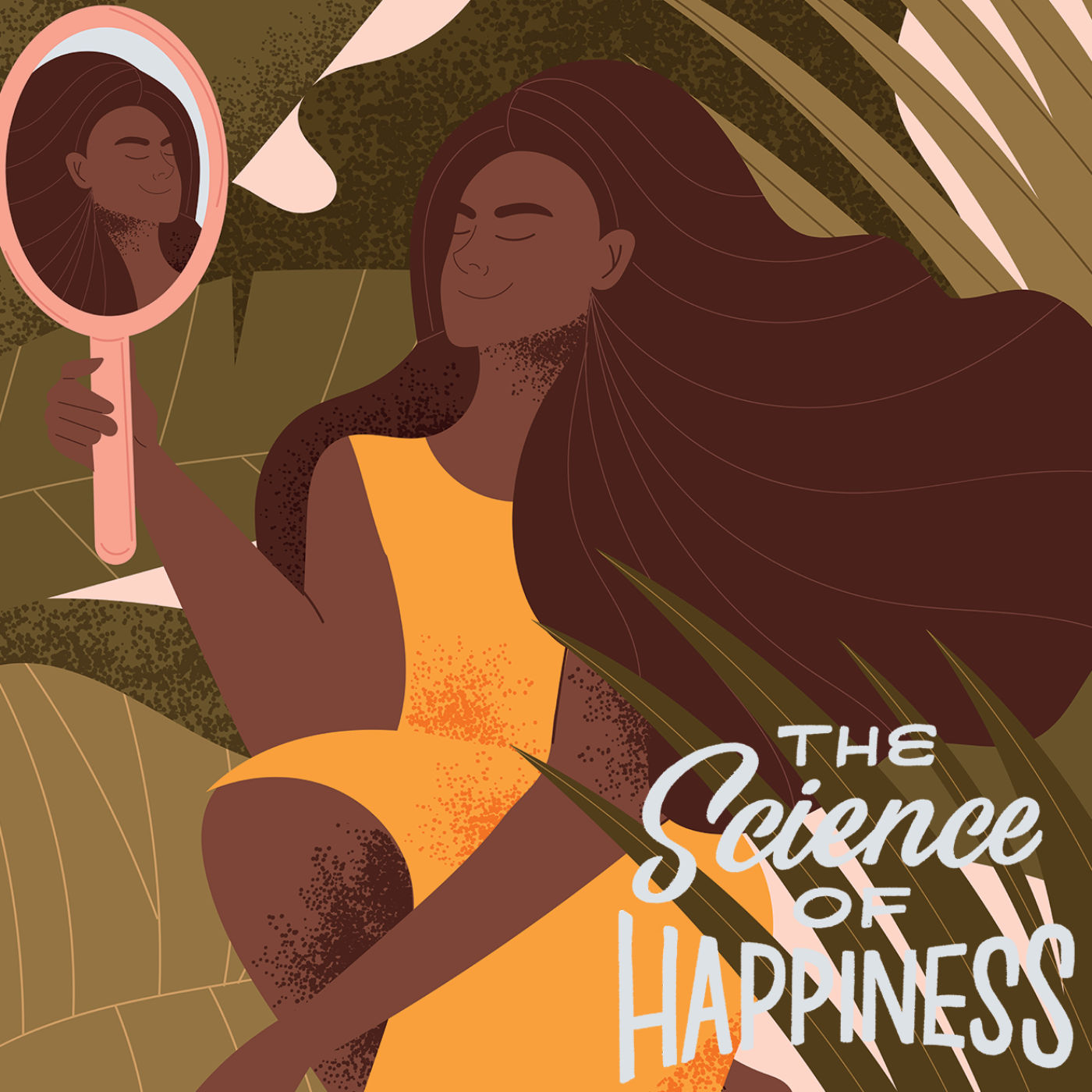

Self-compassion reduces our feelings of shame and self-doubt. We explore a practice to help quiet our inner critic with kindness. Summary: What does your inner critic sound like? Many of us carry echoes of past misunderstandings, pressures, or expectations. Voices that show up as shame, self-judgment, or the belief that we’re not doing enough. This episode explores a self-compassionate writing practice that helps interrupt those patterns by noticing how we talk to ourselves and learning to respond with more kindness. HOW TO DO THIS PRACTICE: __ CHOOSE SOMETHING YOU FEEL ASHAMED ABOUT OR CRITICAL OF: Pick a moment or pattern that brings up self-blame, embarrassment, or disappointment. It doesn’t need to be huge, just something that regularly activates your inner critic. DESCRIBE THE SITUATION HONESTLY AND WITHOUT JUDGMENT: Write down what happened and how it made you feel. Let the tone be neutral, like you’re simply acknowledging what’s true. No harsh labels, no minimizing. IMAGINE SOMEONE WHO LOVES YOU SPEAKING TO YOU: This could be a close friend, mentor, future self, or the voice you’d naturally use when comforting someone you care about. Let that tone guide the rest of the letter. WRITE TO YOURSELF WITH COMPASSION, ACCEPTANCE, AND UNDERSTANDING: Recognize the difficulty, normalize the feelings, offer reassurance and warmth, acknowledge your strengths and intentions. Treat yourself the way you’d treat someone who came to you hurting. REFRAME YOUR STRUGGLE IN A KINDER, MORE ACCURATE WAY: Gently question the harsh story you usually tell yourself. Identify what was actually happening beneath the shame— survival instincts, past patterns, symptoms, fear, or overwhelm. Offer yourself a more truthful, generous narrative. SET THE LETTER ASIDE THEN COME BACK AND READ IT: After a little time (an hour or a day), return to what you wrote. Notice how it feels to receive your own compassion. Let the warmth land. Over time, rereading and rewriting letters like this can shift your inner voice toward kindness and authenticity. __ TODAY’S GUESTS: RENÉ BROOKS is the creator of the blog Black Girl, Lost Keys. She draws on her personal experiences to coach and assist adults with ADHD. Visit René’s Blog: HTTPS://BLACKGIRLLOSTKEYS.COM/ https://blackgirllostkeys.com/ SERENA CHEN is the Chair of the Psychology department at UC Berkeley. Her research is focused on self-compassion, wellbeing, and social interaction. Learn more about Serena and her work: HTTPS://TINYURL.COM/MRY3VX3V https://tinyurl.com/mry3vx3v RELATED THE SCIENCE OF HAPPINESS EPISODES: Why Compassion Requires Vulnerability: HTTPS://TINYURL.COM/YXW4UHPF https://tinyurl.com/yxw4uhpf RELATED HAPPINESS BREAKS: Fierce Self-Compassion Break: HTTPS://TINYURL.COM/YK9YZH9U https://tinyurl.com/yk9yzh9u Tell us about your experience with this practice. Email us at happinesspod@berkeley.edu or follow on Instagram @HAPPINESSPOD https://www.instagram.com/scienceofhappinesspod/#. Help us share The Science of Happiness! Leave us a 5-star review on Apple Podcasts and share this link with someone who might like the show: HTTPS://TINYURL.COM/2P9H5AAP https://tinyurl.com/2p9h5aap https://tinyurl.com/et2spbbp
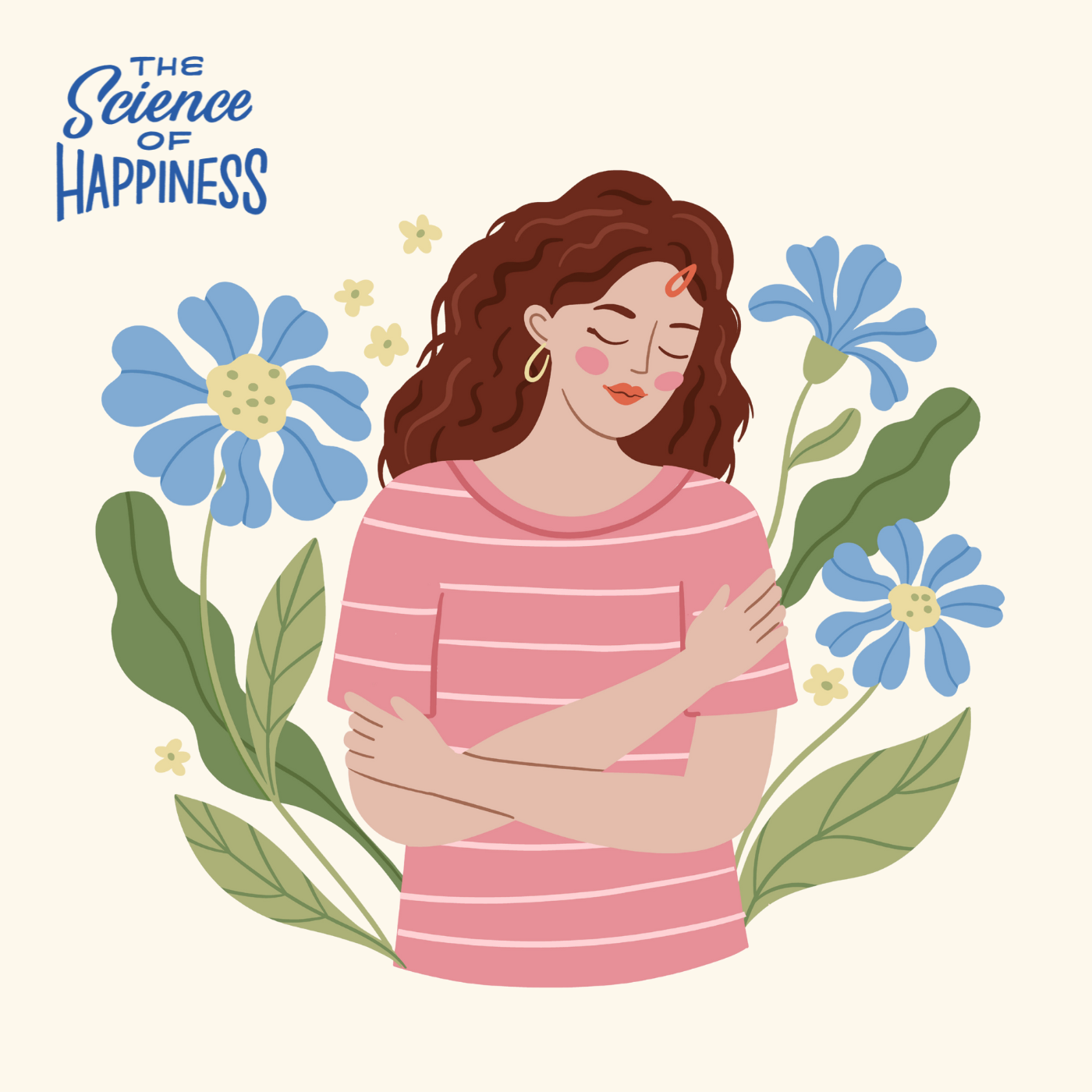

When gratitude feels distant, gently notice what’s here now— creating space for both heaviness and small moments of appreciation. How To Do This Practice: __ GET COMFORTABLE: Sit upright or lie down. Whatever feels most supportive. Then soften your gaze or close your eyes. TAKE THREE SLOW BREATHS: Let your body begin to settle. Feel the tension release a little more with each exhale. NOTICE HOW YOU’RE FEELING: Without changing anything, simply acknowledge what’s present—tiredness, frustration, numbness, ease—whatever it is. MAKE SPACE FOR WHAT’S HARD: Recognize that the world can feel heavy. It’s okay to hold grief, anger, or stress. You don't have to push it away. GENTLY NOTICE THE PRESENT MOMENT: Shift your attention to something neutral: your breath, your feet on the floor, the air on your skin. Just observe. LOOK FOR ONE SMALL THING TO APPRECIATE: Ask: A warm cup of coffee, a slower breath, the fact that you showed up. __ TODAY’S HAPPINESS BREAK GUIDE: DACHER KELTNER is the host of The Science of Happiness podcast and is a co-instructor of the Greater Good Science Center’s popular online course of the same name. He’s also a professor of psychology at the University of California, Berkeley. RELATED HAPPINESS BREAK EPISODES: A Meditation on Original Love: https://tinyurl.com/5u298cv4 Loving Kindness Meditation: https://tinyurl.com/2kr4fjz5 Who Takes Care of You: HTTPS://TINYURL.COM/5XMFKF73 https://tinyurl.com/5xmfkf73 RELATED SCIENCE OF HAPPINESS EPISODES: Nine Steps to Forgiveness: HTTPS://TINYURL.COM/VB7KK5KY https://tinyurl.com/vb7kk5ky How to Show Up For Yourself: HTTPS://TINYURL.COM/56KTB9XC https://tinyurl.com/56ktb9xc Who’s Always There for You: HTTPS://TINYURL.COM/YT3EJJ6W https://tinyurl.com/yt3ejj6w https://tinyurl.com/happyhappysurvey Follow us on Instagram: @SCIENCEOFHAPPINESSPOD https://www.instagram.com/scienceofhappinesspod/ We’d love to hear about your experience with this practice! Share your thoughts at happinesspod@berkeley.edu or use the hashtag #happinesspod. Find us on Apple Podcasts: HTTPS://TINYURL.COM/2P9H5AAP https://tinyurl.com/2p9h5aap Help us share Happiness Break! Leave a 5-star review and share this link: HTTPS://TINYURL.COM/2P9H5AAP https://tinyurl.com/2p9h5aap Transcription: HTTPS://TINYURL.COM/F6XA56MX https://tinyurl.com/f6xa56mx
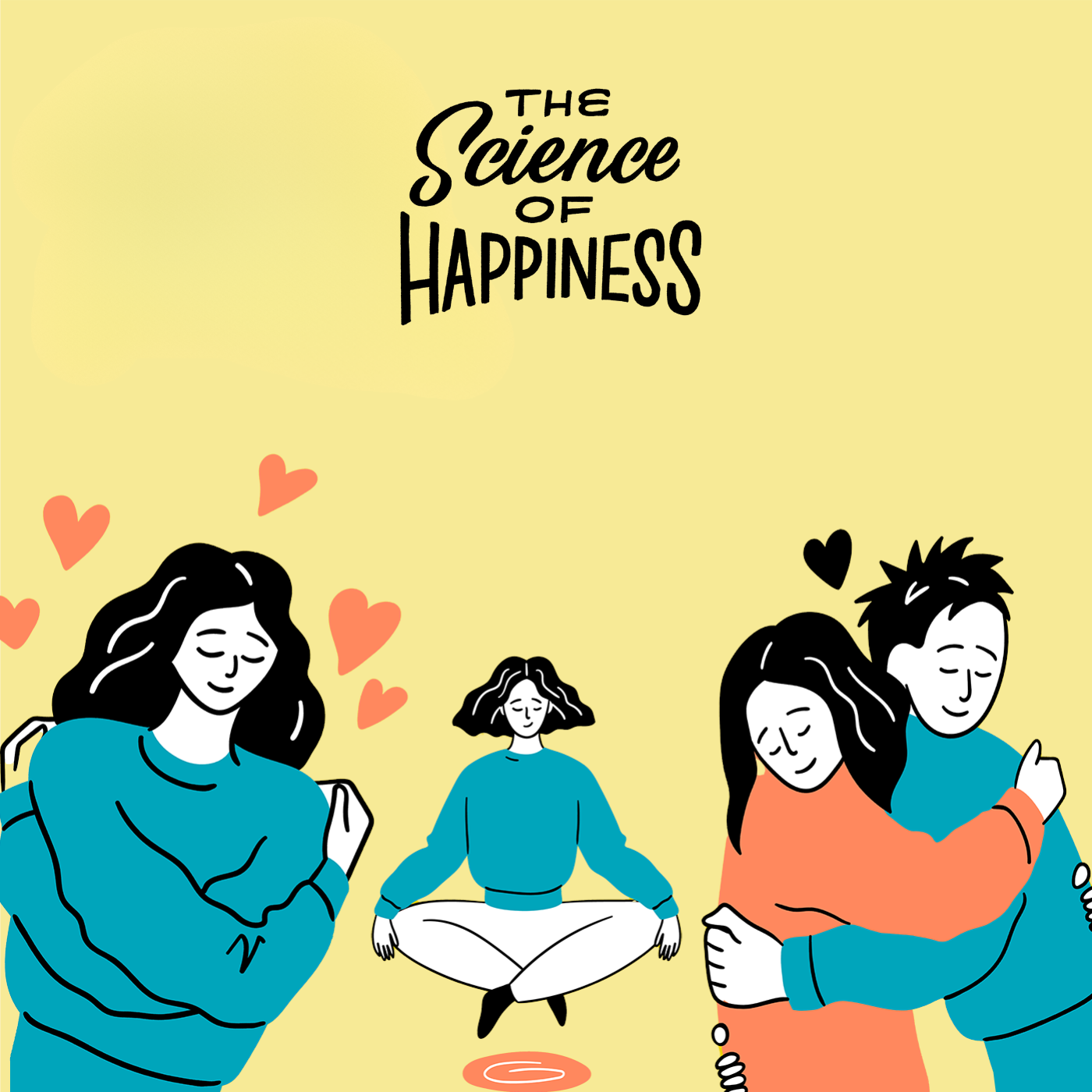

Doing good for others benefits our own minds and bodies, as well. We explore the science of kindness. Summary: On this episode of The Science of Happiness we explore how everyday acts of kindness strengthen our sense of connection and belonging, and why our brains are built to feel good when we support others. Drawing from both research and lived experience, we examine how even small gestures can reduce anxiety, increase purpose, and ripple outward through our communities. We also look at why kindness flourishes when it’s spontaneous and genuine, and how practicing it can open us to deeper presence, vulnerability, and joy. HOW TO DO THIS PRACTICE: __ SET AN INTENTION: Take a moment each evening to reflect on the day ahead and choose a general theme for how you want to show kindness. Like offering gratitude, being more present, or supporting someone who comes to mind. KEEP IT FLEXIBLE: Rather than creating a rigid checklist, identify a few broad “buckets” of kindness so you can let opportunities arise naturally. NOTICE MOMENTS TO CONNECT: As you move through your day, look for organic openings to offer warmth. Whether through a sincere compliment, a helpful gesture, or simply slowing down to truly listen. ACT ON WHAT FEELS GENUINE: Choose gestures that feel authentic to you and appropriate to the moment, aiming for sincerity over perfection. REFLECT BRIEFLY: At the end of the day, jot down the acts you did and how they felt—for you and for others—paying attention to small emotional shifts or moments of connection. STAY GENTLE WITH YOURSELF: If you miss a moment or a day feels off, reset without judgment; the practice is about cultivating awareness and kindness, not completing a task list. __ TODAY’S GUESTS: DANA MERWIN is a progressional clown and performer based in San Francisco. Learn about Dana’s Work: HTTPS://TINYURL.COM/BD6EW95A https://tinyurl.com/bd6ew95a Follow Dana on Instagram: https://tinyurl.com/dspstzrk DAVID CREGG is a clinical psychologist at South Texas Veterans Health Care System whose research specializes in positive psychology. Find more of David’s work here: HTTPS://TINYURL.COM/AJAY6N6A https://tinyurl.com/ajay6n6a RELATED THE SCIENCE OF HAPPINESS EPISODES: Why Compassion Requires Vulnerability: HTTPS://TINYURL.COM/YXW4UHPF https://tinyurl.com/yxw4uhpf The Contagious Power of Compassion: HTTPS://TINYURL.COM/3X7W2S5S https://tinyurl.com/3x7w2s5s Who’s Always There For You: HTTPS://TINYURL.COM/YT3EJJ6W https://tinyurl.com/yt3ejj6w RELATED HAPPINESS BREAKS: Tap into the Joy That Surrounds You: HTTPS://TINYURL.COM/2PB8YE9X https://tinyurl.com/2pb8ye9x A Meditation for When Others Are Suffering: HTTPS://TINYURL.COM/2TCP2AN9 https://tinyurl.com/2tcp2an9 Tell us about your experience with this practice. Email us at happinesspod@berkeley.edu or follow on Instagram @HAPPINESSPOD https://www.instagram.com/scienceofhappinesspod/#. Help us share The Science of Happiness! Leave us a 5-star review on Apple Podcasts and share this link with someone who might like the show: HTTPS://TINYURL.COM/2P9H5AAP https://tinyurl.com/2p9h5aap Transcription: HTTPS://TINYURL.COM/YX64NK2N https://tinyurl.com/yx64nk2n
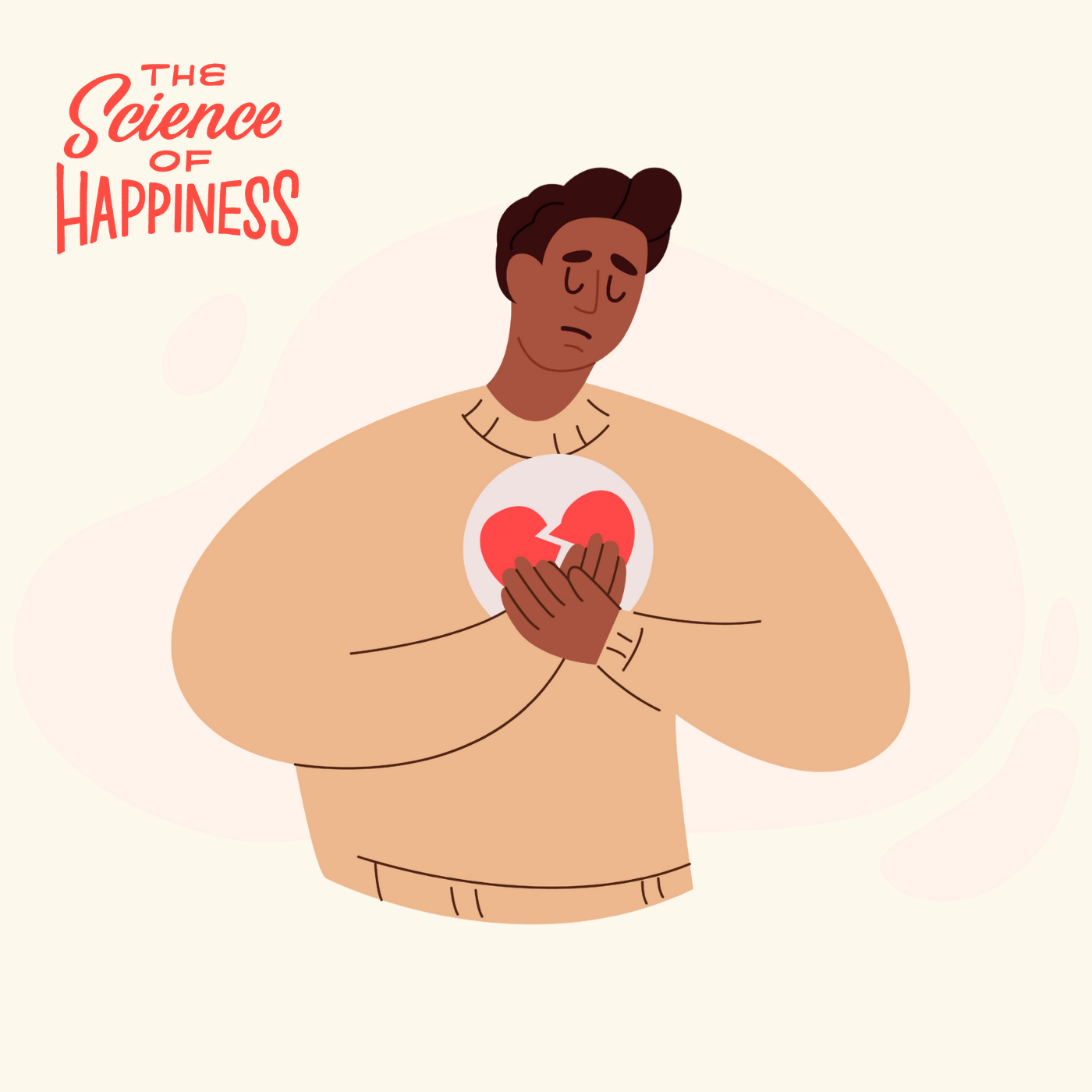

Explore a gentle practice for releasing resentment and finding freedom through forgiveness. HOW TO DO THIS PRACTICE: __ PREPARE YOUR SPACE AND BODY: Find a quiet, safe place to sit and take slow, grounding breaths. Notice any tension in your body and gently release it with each exhale. IDENTIFY WHO YOU’RE READY TO FORGIVE: Bring to mind two or three people who have hurt you, and start with the one whose actions feel least painful. Reflect on how this hurt still affects your emotions and body. ACKNOWLEDGE THE HURT: Recognize what happened and how it impacted your life, trust, or well-being. Allow yourself to feel the pain without judgment. SEEK TO UNDERSTAND (WITHOUT EXCUSING): Consider what struggles or past hurts might have influenced the other person’s behavior. This step is about seeing their humanity, not condoning their actions. MAKE THE CHOICE TO FORGIVE: When you feel ready, make an inner decision to release resentment and let go of the burden it carries. Offer kindness, respect, or simply your intention to move forward. REFLECT AND OFFER YOURSELF COMPASSION: Notice any small sense of softening or relief, and honor where you are in the process. End by thanking yourself for taking a step toward healing. __ TODAY’S HAPPINESS BREAK GUIDE: DACHER KELTNER is the host of The Science of Happiness podcast and is a co-instructor of the Greater Good Science Center’s popular online course of the same name. He’s also a professor of psychology at the University of California, Berkeley. RELATED HAPPINESS BREAK EPISODES: A Science-Backed Path to Self-Forgiveness: HTTPS://TINYURL.COM/YH2A5URT https://tinyurl.com/yh2a5urt A Note to Self on Forgiveness: HTTPS://TINYURL.COM/Y53TKN87 https://tinyurl.com/y53tkn87 Make Uncertainty Part of the Process: HTTPS://TINYURL.COM/234U5DS7 https://tinyurl.com/234u5ds7 RELATED SCIENCE OF HAPPINESS EPISODES: Nine Steps to Forgiveness: HTTPS://TINYURL.COM/VB7KK5KY https://tinyurl.com/vb7kk5ky The Science of Letting Go: HTTPS://TINYURL.COM/566T8UDF https://tinyurl.com/566t8udf The Contagious Power of Compassion: HTTPS://TINYURL.COM/3X7W2S5S https://tinyurl.com/3x7w2s5s https://ggsc.berkeley.edu/what_we_do/major_initiatives/forgiveness We’d love to hear about your experience with this practice! Share your thoughts at happinesspod@berkeley.edu or use the hashtag #happinesspod. Find us on Apple Podcasts: HTTPS://TINYURL.COM/2P9H5AAP https://tinyurl.com/2p9h5aap Help us share Happiness Break! Leave a 5-star review and share this link: HTTPS://TINYURL.COM/2P9H5AAP https://tinyurl.com/2p9h5aap : https://tinyurl.com/trnz9x8n
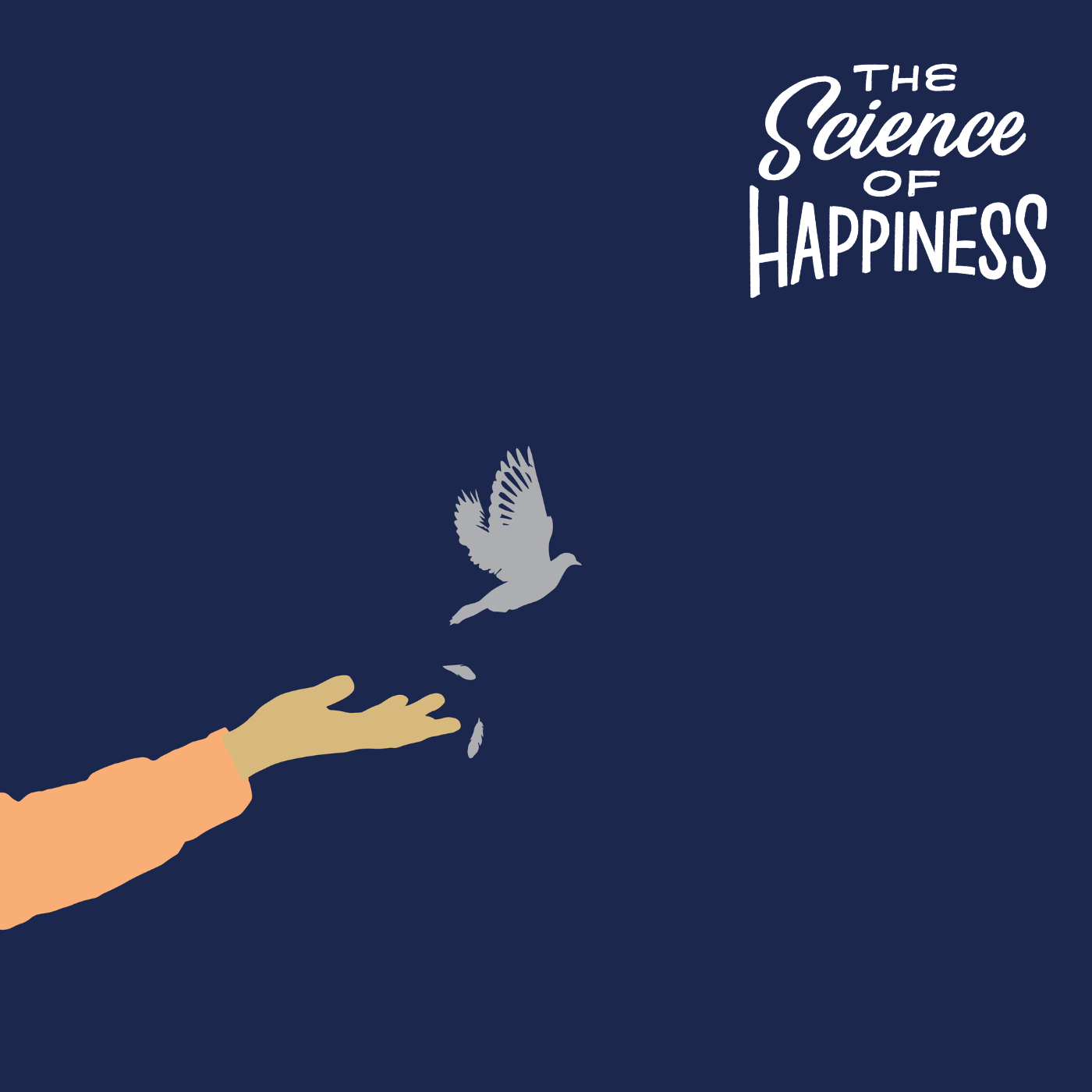

Discover how forgiveness reshapes the brain, eases the body, and helps us move forward with greater compassion and freedom. Summary: Forgiveness isn’t about forgetting or excusing—it’s about releasing the grip of resentment so we can make room for peace. Research shows it also engages empathy, strengthens emotional regulation, and helps us reconnect with what truly matters. In this episode of The Science of Happiness, we look at how forgiveness transforms not just relationships, but our overall well-being. HOW TO DO THIS PRACTICE: __ ACKNOWLEDGE THE HURT: Be honest about what happened and how it affected you—avoiding or denying the pain can keep it alive. EMPATHIZE WITH THE OTHER PERSON: Try to see their humanity and what might have led them to act as they did, without excusing the harm. CHOOSE TO FORGIVE: Decide, for your own peace, to let go of resentment and stop letting the past control your emotions. OFFER FORGIVENESS AS A GIFT: Imagine extending understanding or compassion toward the person, even if they never apologize. COMMIT TO YOUR CHOICE: Write it down, share it, or reflect on it as a reminder of your intention when old feelings resurface. PRACTICE HOLDING ON TO PEACE: When reminders or emotions arise, return to calm, compassion, or gratitude—strengthening forgiveness over time. __ TODAY’S GUESTS: DR. EVERETT WORTHINGTON is one of the world's leading experts on forgiveness. Learn more about Dr. Everett Worthington here: HTTPS://WWW.EVWORTHINGTON-FORGIVENESS.COM/ https://www.evworthington-forgiveness.com/ DR. EMILIANA SIMON-THOMAS is a neuroscientist and Director of Science at UC Berkeley’s Greater Good Science Center. Learn more about Emiliana R. Simon-Thomas here: HTTPS://TINYURL.COM/2Z7MHJBM https://tinyurl.com/2z7mhjbm RELATED THE SCIENCE OF HAPPINESS EPISODES: The Contagious Power of Compassion: HTTPS://TINYURL.COM/3X7W2S5S https://tinyurl.com/3x7w2s5s Nine Steps to Forgiveness: HTTPS://TINYURL.COM/VB7KK5KY https://tinyurl.com/vb7kk5ky Why Compassion Requires Vulnerability: HTTPS://TINYURL.COM/YXW4UHPF https://tinyurl.com/yxw4uhpf RELATED HAPPINESS BREAKS: A Science-Backed Path to Self-Forgiveness: HTTPS://TINYURL.COM/YH2A5URT https://tinyurl.com/yh2a5urt Make Uncertainty Part of the Process: HTTPS://TINYURL.COM/234U5DS7 https://tinyurl.com/234u5ds7 A Note to Self on Forgiveness: HTTPS://TINYURL.COM/Y53TKN87 https://tinyurl.com/y53tkn87 https://ggsc.berkeley.edu/what_we_do/major_initiatives/forgiveness Tell us about your experience with this practice. Email us at happinesspod@berkeley.edu or follow on Instagram @HAPPINESSPOD https://www.instagram.com/scienceofhappinesspod/#. Help us share The Science of Happiness! Leave us a 5-star review on Apple Podcasts and share this link with someone who might like the show: HTTPS://TINYURL.COM/2P9H5AAP https://tinyurl.com/2p9h5aap https://tinyurl.com/566t8udf
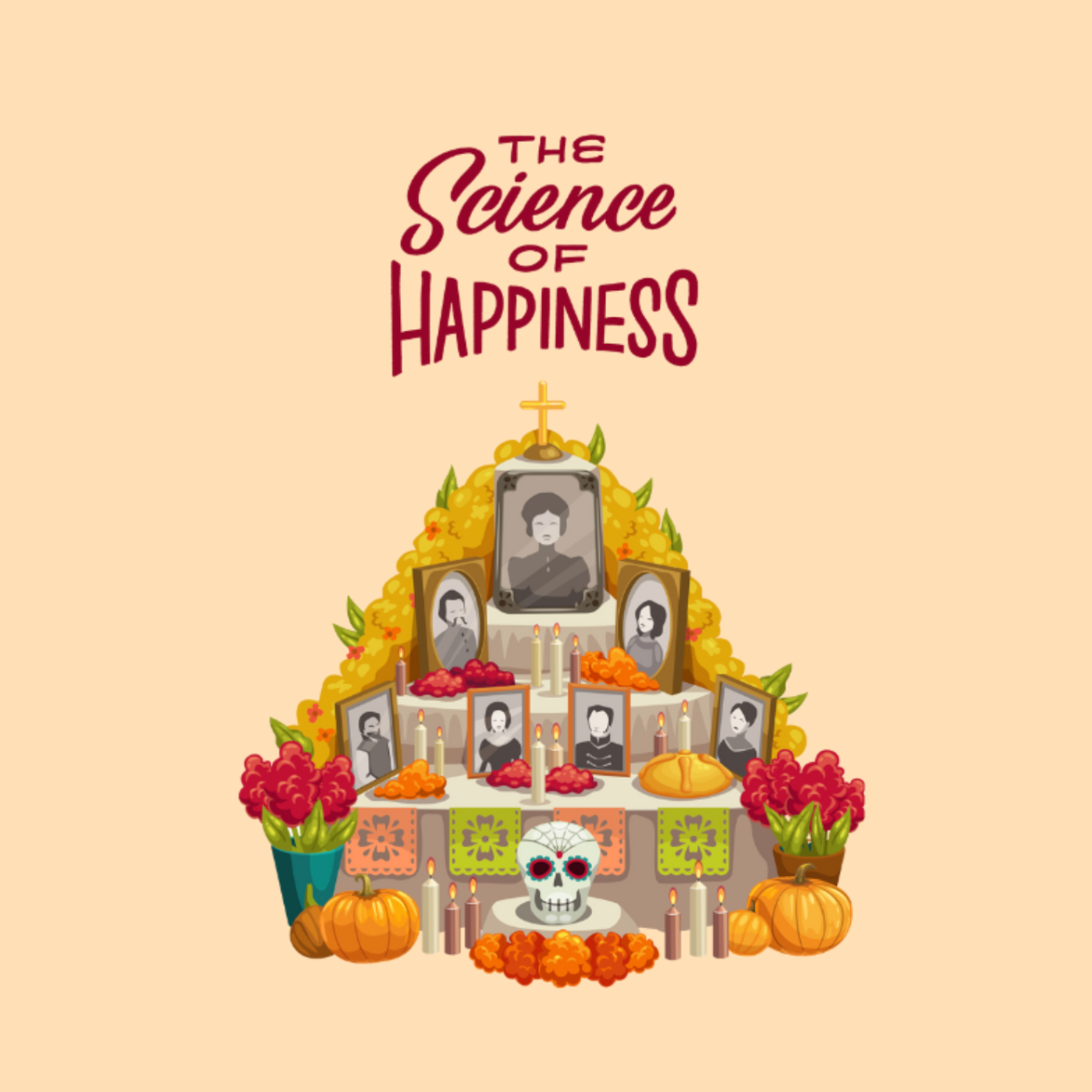

We explore Día de los Muertos as a ritual that nurtures community, imbues loss with meaning, and helps us process grief while also connecting through shared joy. Summary: We investigate how Día de los Muertos, or Day of the Dead, rituals strengthen family ties and cultural identity, and learn about its evolution from a 3,000 year old practice to a global celebration. We look at key elements like the ofrenda and explore how commercialization—like Mattel’s Day of the Dead Barbie—raises questions about balancing tradition with modern influences. HOW TO DO THIS PRACTICE: __ __ TODAY’S GUESTS: MICHELLE TELLÉZ is an Associate Professor in Mexican-American studies at Arizona State University. Learn more about Michelle: HTTPS://TINYURL.COM/2PH3CAN7 https://tinyurl.com/2ph3can7 MATHEW SANDOVAL, a.ka. "Dr. Muerte," is an artist and Associate Professor at Arizona State University. He is a leading expert on Día de los Muertos. Learn more about Mathew: MATHEWSANDOVAL.COM http://mathewsandoval.com/ RELATED THE SCIENCE OF HAPPINESS EPISODES: The Healing Effects of Experiencing Wildlife: HTTPS://TINYURL.COM/BDE5AV4Z https://tinyurl.com/bde5av4z Who’s Always There For You: HTTPS://TINYURL.COM/YT3EJJ6W https://tinyurl.com/yt3ejj6w How Thinking About Your Ancestors Can Help You Thrive: HTTPS://TINYURL.COM/4U6VZS2W https://tinyurl.com/4u6vzs2w RELATED HAPPINESS BREAKS: A Meditation on Love and Interconnectedness: HTTPS://TINYURL.COM/YE6BAXV3 https://tinyurl.com/ye6baxv3 A Meditation to Connect With Your Roots: HTTPS://TINYURL.COM/YCY9XAZC https://tinyurl.com/ycy9xazc Tell us about your experience with this practice. Email us at happinesspod@berkeley.edu or follow on Instagram @HAPPINESSPOD https://www.instagram.com/scienceofhappinesspod/#. Help us share The Science of Happiness! Leave us a 5-star review on Apple Podcasts and share this link with someone who might like the show: HTTPS://TINYURL.COM/2P9H5AAP https://tinyurl.com/2p9h5aap HTTPS://TINYURL.COM/JERRUY47 https://tinyurl.com/jerruy47
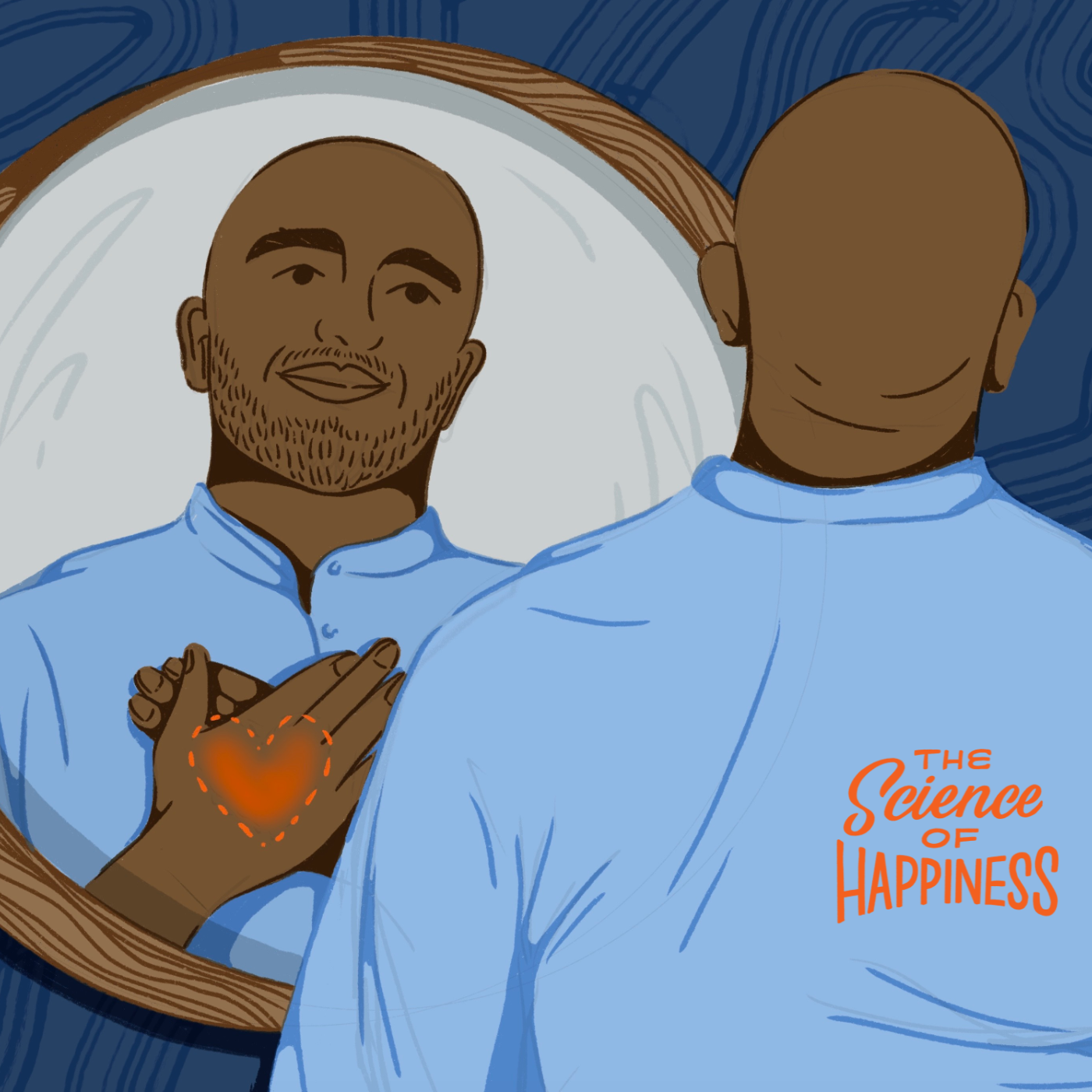

Show yourself real self-kindness in less than 10 minutes with this self-compassion break guided by psychologist Kristin Neff. HOW TO DO THIS PRACTICE: __ IDENTIFY WHAT’S HARD RIGHT NOW: Bring to mind a real situation that’s causing you stress, sadness, or self-criticism, something that’s currently difficult. It could be a mistake, a relationship challenge, or a feeling of not being enough. ACKNOWLEDGE YOUR PAIN: Notice what’s happening inside you without judgment. Gently name it: or REMEMBER YOU’RE NOT ALONE: Remind yourself that struggle is part of being human. Say something like: or OFFER YOURSELF KINDNESS: Bring warmth to the part of you that’s hurting. You might place a hand over your heart, hold your face gently, or clasp your hands. Physical touch helps calm the nervous system and signals care. SPEAK SUPPORTIVE WORDS TO YOURSELF: Say something to yourself that you’d say to a good friend in the same situation like, LET THE COMPASSION SINK IN: Take a few slow breaths. Feel your body softening. Notice any sense of calm, warmth, or ease that arises, even if it’s subtle. You can return to this practice anytime you feel overwhelmed or self-critical. __ Today’s Happiness Break Guide: Dr. Kristin Neff is an associate professor in the University of Texas at Austin's department of educational psychology. She's also the co-author of 'MINDFUL SELF-COMPASSION FOR BURNOUT, https://self-compassion.org/mindful-self-compassion-for-burnout/' which offers tools to help individuals heal and recharge from burnout. RELATED HAPPINESS BREAK EPISODES: The Healing Power of Your Own Touch: HTTPS://TINYURL.COM/Y4ZE59H8 https://tinyurl.com/y4ze59h8 A Self-Compassion Meditation For Burnout: HTTPS://TINYURL.COM/485Y3B4Y https://tinyurl.com/485y3b4y Tap into the Joy That Surrounds You: HTTPS://TINYURL.COM/2PB8YE9X https://tinyurl.com/2pb8ye9x RELATED SCIENCE OF HAPPINESS EPISODES: How to Stick to Your Resolutions in 2024: HTTPS://TINYURL.COM/MUB9Z9Z4 https://tinyurl.com/mub9z9z4 How Holding Yourself Can Reduce Stress: HTTPS://TINYURL.COM/2HVHKWE6 https://tinyurl.com/2hvhkwe6 Why We Need Friends With Shared Interests: HTTPS://TINYURL.COM/BP8MSACJ https://tinyurl.com/bp8msacj We’d love to hear about your experience with this practice! Share your thoughts at happinesspod@berkeley.edu or use the hashtag #happinesspod. Find us on Apple Podcasts: HTTPS://TINYURL.COM/2P9H5AAP https://tinyurl.com/2p9h5aap Help us share ! Leave a 5-star review and share this link: HTTPS://TINYURL.COM/2P9H5AAP https://tinyurl.com/2p9h5aap Transcription: HTTPS://TINYURL.COM/3EEP76Z6 https://tinyurl.com/3eep76z6
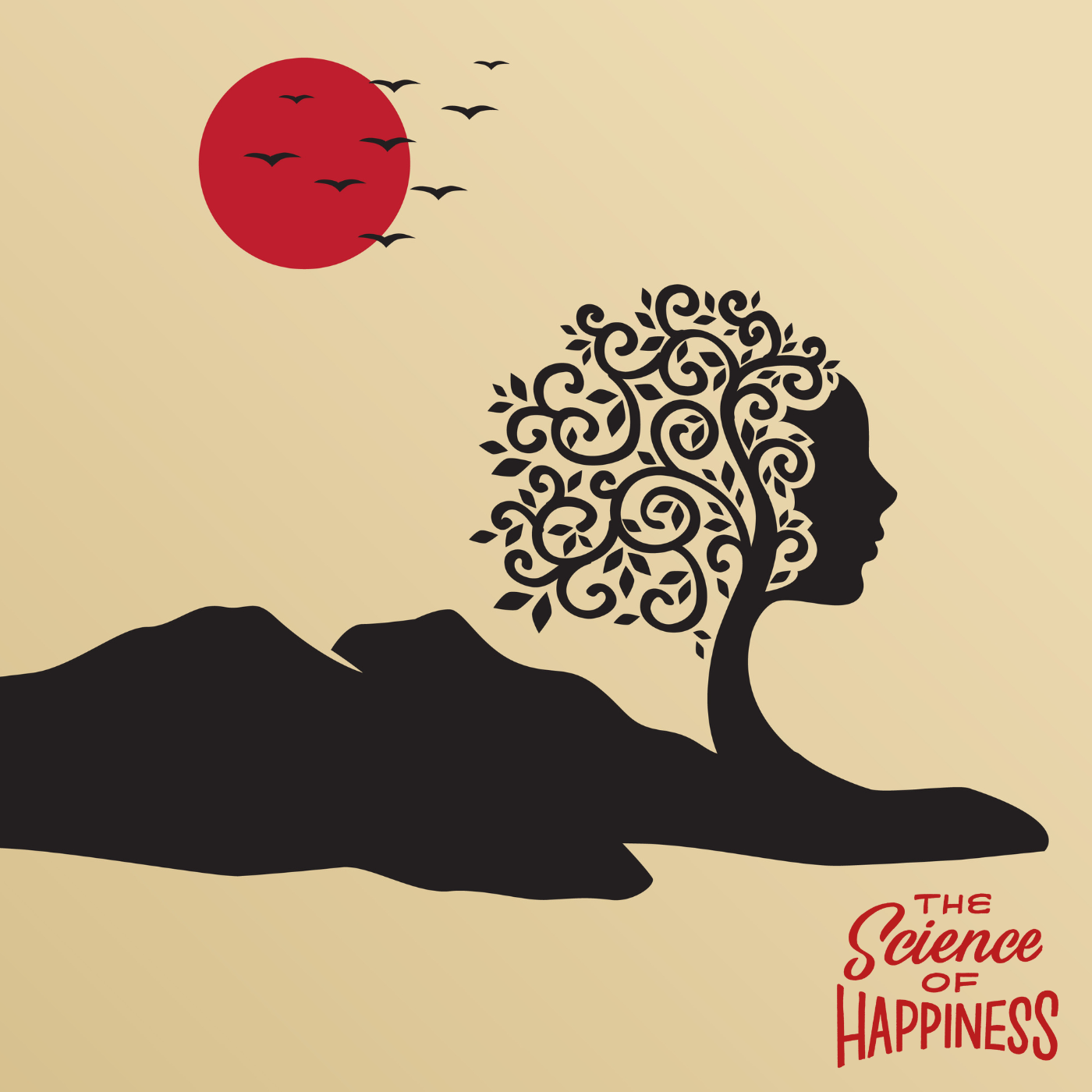

What happens when imagination meets perception, and ordinary objects come alive? We explore the science of pareidolia. Summary: Our minds are wired to find meaning, even in randomness— which is why sometimes we can see faces and patterns in everyday objects. In this episode of The Science of Happiness, we explore how this phenomenon, called pareidolia, can shift how we experience our surroundings and open ourselves to more creativity, connection, and calm. HOW TO DO THIS PRACTICE: __ PAUSE AND SETTLE: Take a few slow breaths and allow yourself to slow down. Let your mind soften its focus. CHOOSE YOUR SPACE: Look around your home, your walk, or wherever you are. Everyday objects work best— walls, trees, clouds, shadows. LET CURIOSITY LEAD: Notice shapes, textures, or patterns that catch your eye. Don’t try to find something, just observe. SEE WHAT APPEARS: Allow your imagination to play. Do you see a face, an animal, a tiny scene hidden in plain sight? STAY WITH IT: Notice how it feels to find meaning in randomness. What emotions or memories come up? REFLECT AND RETURN: Take a final look around. Does your space or the way you see the things around you feel any different now? __ TODAY’S GUESTS: MALIK MAYS is an Oakland-based musician who also releases music under the name Mahawam. Learn more about Malik here: HTTPS://MAHAWAM.COM/BIO https://mahawam.com/bio ANTOINE BELLEMARE-PEPIN is a neuroscientist and artist, who researches the connection between pareidolia and creativity. Learn more about Antoine here: HTTPS://TINYURL.COM/233W9RYM https://tinyurl.com/233w9rym RELATED THE SCIENCE OF HAPPINESS EPISODES: The Healing Effects of Experiencing Wildlife: HTTPS://TINYURL.COM/BDE5AV4Z https://tinyurl.com/bde5av4z Why Going Offline Might Save Us: HTTPS://TINYURL.COM/E7RHSAKJ https://tinyurl.com/e7rhsakj How To Tune Out The Noise: HTTPS://TINYURL.COM/4HHEKJUH https://tinyurl.com/4hhekjuh RELATED HAPPINESS BREAKS: Pause to Look at the Sky: HTTPS://TINYURL.COM/4JTTKBW3 https://tinyurl.com/4jttkbw3 How To Ground Yourself in Nature: HTTPS://TINYURL.COM/25FTDXPM https://tinyurl.com/25ftdxpm Make Uncertainty Part of the Process: HTTPS://TINYURL.COM/234U5DS7 https://tinyurl.com/234u5ds7 Tell us about your experience with this practice. Email us at happinesspod@berkeley.edu or follow on Instagram @HAPPINESSPOD https://www.instagram.com/scienceofhappinesspod/#. Help us share The Science of Happiness! Leave us a 5-star review on Apple Podcasts and share this link with someone who might like the show: HTTPS://TINYURL.COM/2P9H5AAP https://tinyurl.com/2p9h5aap HTTPS://TINYURL.COM/YZP9HYKV https://tinyurl.com/yzp9hykv
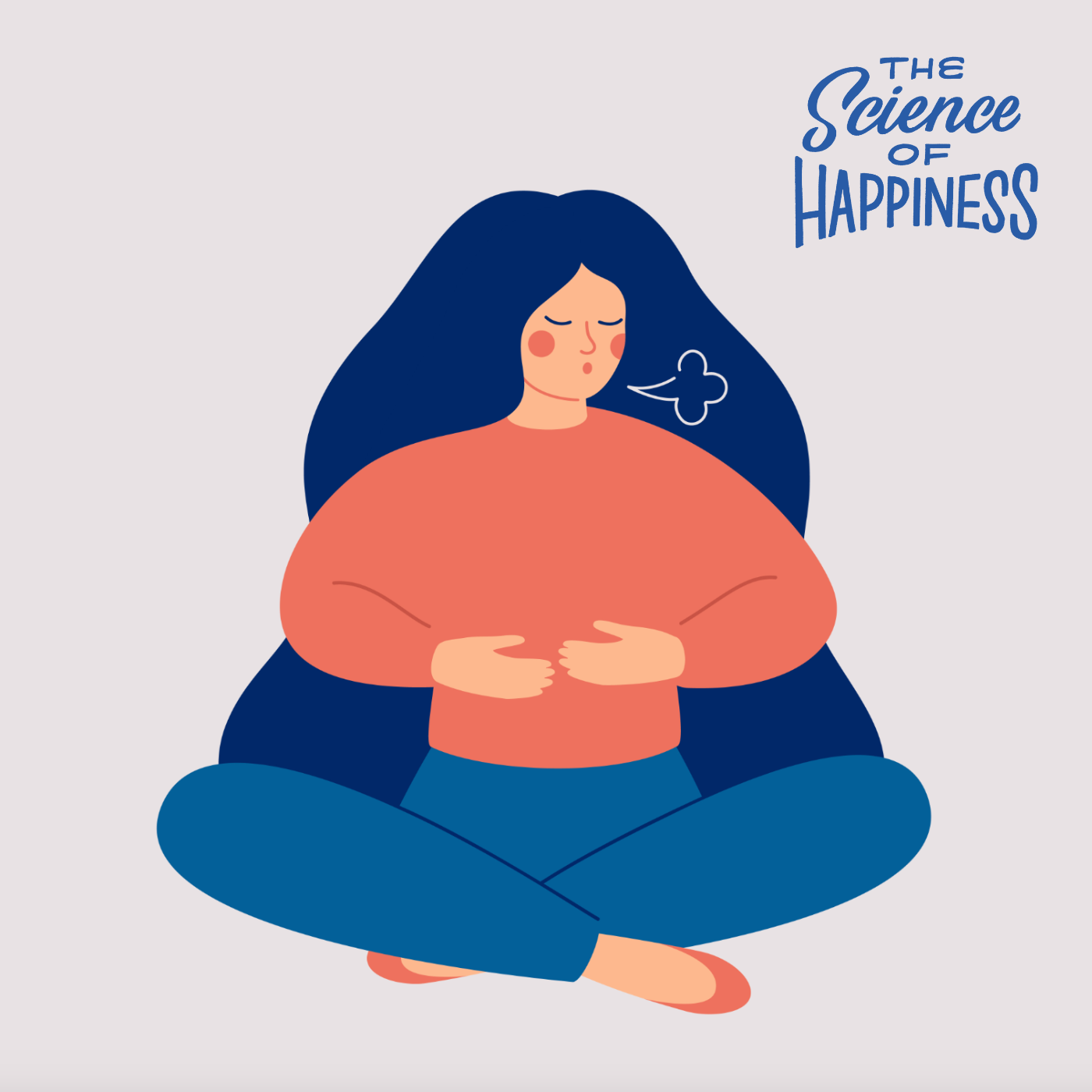

Dedicating a little time to tune into your body fortifies you to better handle the stresses of daily life. HOW TO DO THIS PRACTICE: __ __ TODAY’S HAPPINESS BREAK GUIDE: DACHER KELTNER is the host of The Science of Happiness podcast and is a co-instructor of the Greater Good Science Center’s popular online course of the same name. He’s also a professor of psychology at the University of California, Berkeley. RELATED HAPPINESS BREAK EPISODES: A Mindful Breath Meditation: HTTPS://TINYURL.COM/MR9D22KR https://tinyurl.com/mr9d22kr Embodying Resilience: HTTPS://TINYURL.COM/46383MHX https://tinyurl.com/46383mhx The Healing Power of Your Own Touch: HTTPS://TINYURL.COM/Y4ZE59H8 https://tinyurl.com/y4ze59h8 RELATED SCIENCE OF HAPPINESS EPISODES: Breathe Away Anxiety: HTTPS://TINYURL.COM/3U7VSRR5 https://tinyurl.com/3u7vsrr5 How To Show Up For Yourself: HTTPS://TINYURL.COM/56KTB9XC https://tinyurl.com/56ktb9xc How Holding Yourself Can Reduce Stress: HTTPS://TINYURL.COM/2HVHKWE6 https://tinyurl.com/2hvhkwe6 Follow us on Instagram: @SCIENCEOFHAPPINESSPOD https://www.instagram.com/scienceofhappinesspod/ We’d love to hear about your experience with this practice! Share your thoughts at happinesspod@berkeley.edu or use the hashtag #happinesspod. Find us on Apple Podcasts: HTTPS://TINYURL.COM/2P9H5AAP https://tinyurl.com/2p9h5aap Help us share Happiness Break! Leave a 5-star review and share this link: HTTPS://TINYURL.COM/2P9H5AAP https://tinyurl.com/2p9h5aap Transcription: HTTPS://TINYURL.COM/4FJWAC6Y https://tinyurl.com/4fjwac6y
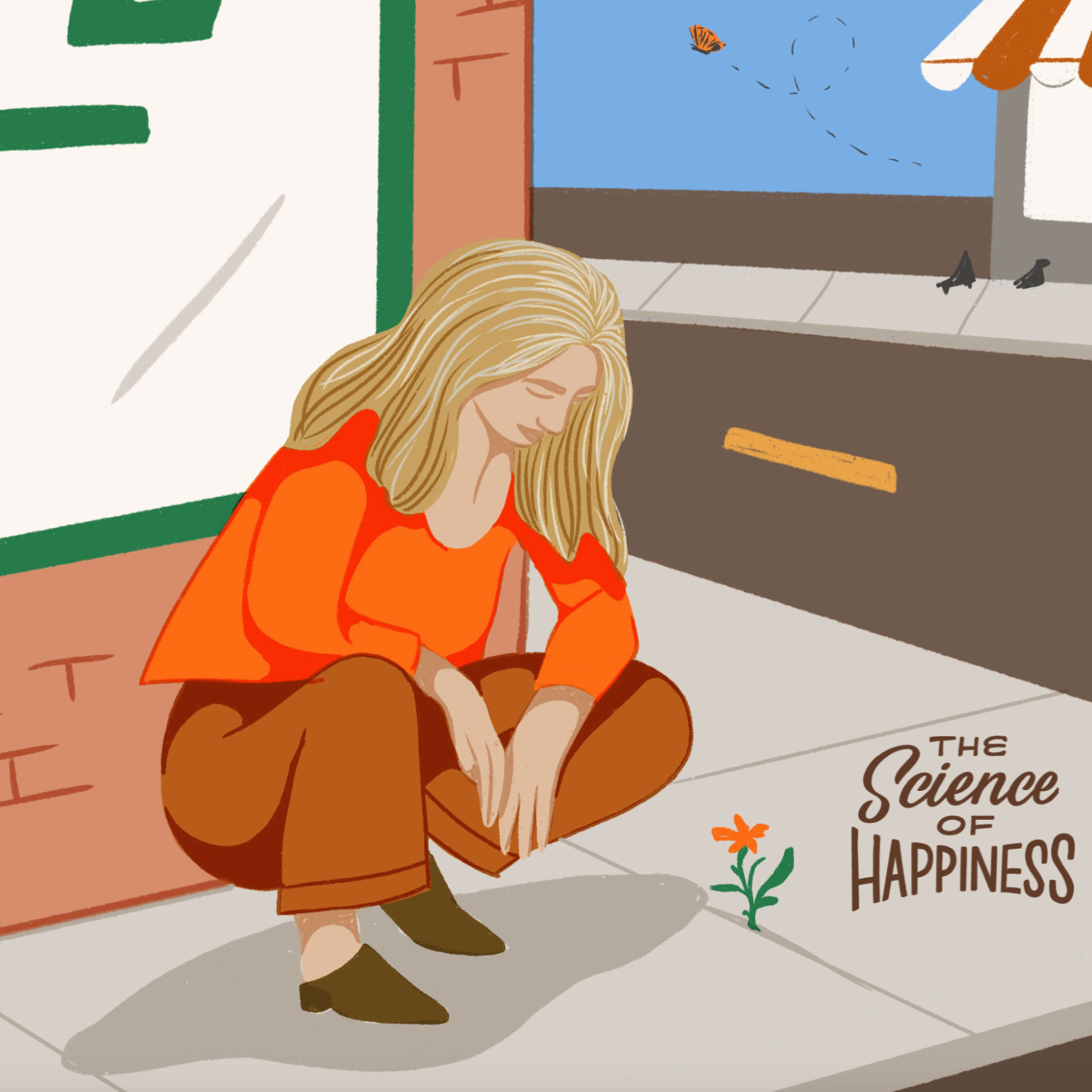

We explore how embracing uncertainty enables us to move beyond climate anxiety and despair to hope and action, with author and activist Rebecca Solnit. Summary: When you think about climate change, do you feel hope? In this episode of The Science of Happiness, we examine what it means to feel hopeful for the future of our planet. Renowned writer and activist Rebecca Solnit shares why she loves uncertainty, what gives her hope, and how hope empowers her. Later, we hear from climate scientist Patrick Gonzalez about why he believes climate hope is scientifically sound, and how much power we truly have to create meaningful change. HOW TO DO THIS PRACTICE: __ ACKNOWLEDGE THE HARD STUFF: Hope doesn’t come from ignoring reality, it begins with honesty. Naming the fears, grief, or overwhelm we feel about climate change and life’s challenges. REMEMBER UNCERTAINTY LEADS TO POSSIBILITY: Despair often assumes the future is fixed. But history is full of surprises and turning points. When we leave space for uncertainty, we leave space for possibility. FOCUS ON PROGRESS, NOT PERFECTION: Every step forward matters. Clean energy expanding, policies shifting, communities protecting what they love. Small and large wins alike fuel the feedback loop between hope and action. NOURISH YOURSELF WITH BEAUTY, AWE, AND JOY: A sunrise, music, dancing, kindness, or the courage of others can all awaken something bigger in us. Awe quiets despair and helps us see new ways forward. CONNECT WITH OTHERS: Hope grows when it’s shared. Joining movements, communities, or simply leaning on friends creates a sense of belonging and power. Together, the ants can move the elephant. PRACTICE HOPE DAILY: Some days hope comes easily; other days it doesn’t. That’s normal. Journaling, noticing progress, limiting bad news, and showing up in community are all ways to keep practicing. __ TODAY’S GUESTS: REBECCA SOLNIT is an author, activist, and historian. She has written over 20 books on Western and Indigenous history, feminism, social change, hope, and disaster. Learn more about Rebecca Solnit here: HTTP://REBECCASOLNIT.NET/ http://rebeccasolnit.net/ PATRICK GONZALEZ is a climate change scientist and forest ecologist at the University of California, Berkeley. Learn more about Patrick Gonzalez here: HTTP://WWW.PATRICKGONZALEZ.NET/ http://www.patrickgonzalez.net/ RELATED THE SCIENCE OF HAPPINESS EPISODES: Climate, Hope, & Science Series: HTTPS://TINYURL.COM/PB27REP https://tinyurl.com/pb27rep The Healing Effects of Experiencing Wildlife: HTTPS://TINYURL.COM/BDE5AV4Z https://tinyurl.com/bde5av4z RELATED HAPPINESS BREAKS: How To Ground Yourself in Nature: HTTPS://TINYURL.COM/25FTDXPM https://tinyurl.com/25ftdxpm Pause to Look at the Sky: HTTPS://TINYURL.COM/4JTTKBW3 https://tinyurl.com/4jttkbw3 Tell us about your experience with this practice. Email us at happinesspod@berkeley.edu or follow on Instagram @HAPPINESSPOD https://www.instagram.com/scienceofhappinesspod/#. Help us share The Science of Happiness! Leave us a 5-star review on Apple Podcasts and share this link with someone who might like the show: HTTPS://TINYURL.COM/2P9H5AAP https://tinyurl.com/2p9h5aap https://tinyurl.com/3uw3hdk3
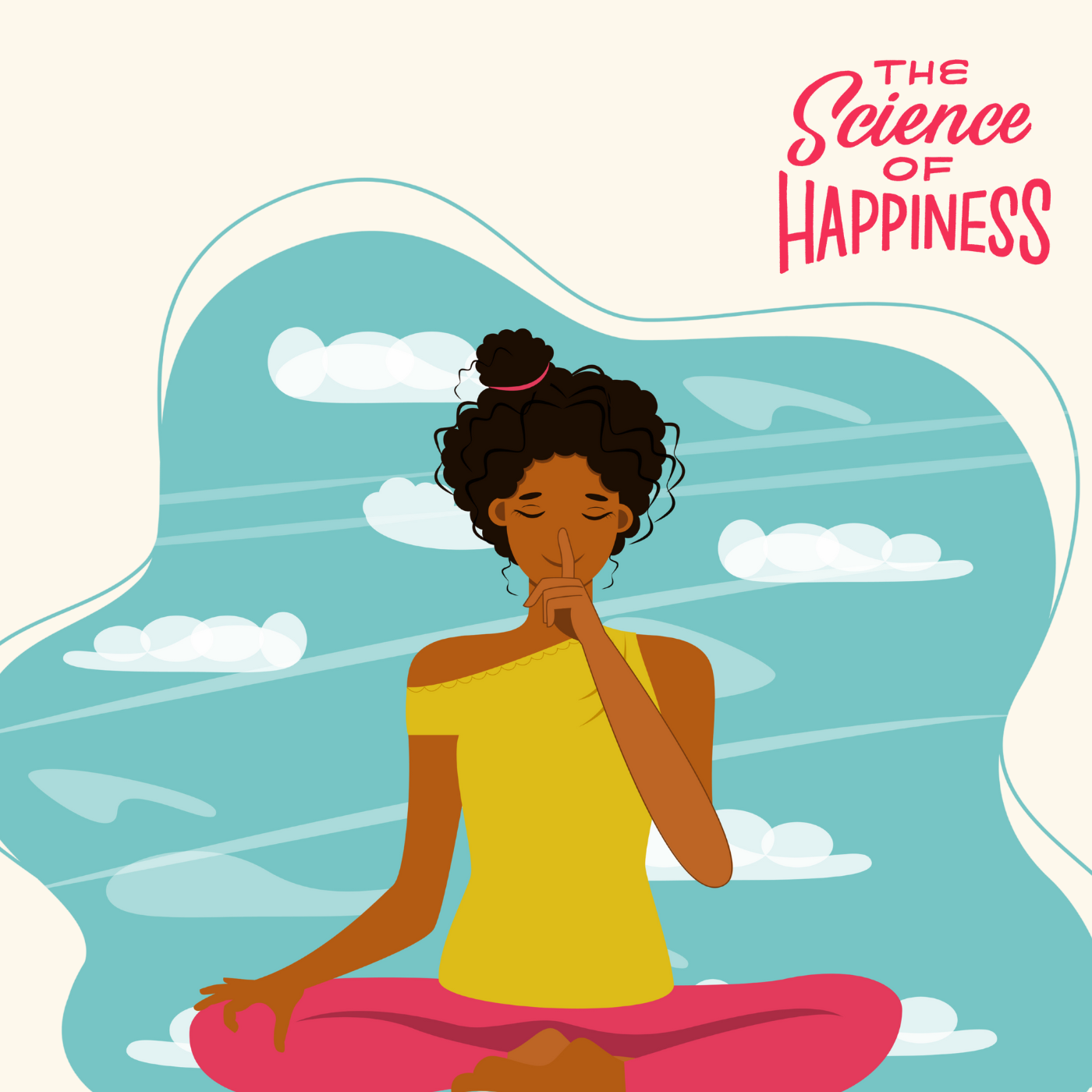

Zen and mindfulness teacher Henry Shukman guides us in a meditation that invites us to listen deeply and find clarity in quiet. HOW TO DO THIS PRACTICE: __ FIND STILLNESS: Sit comfortably in a quiet space. Close your eyes if you’d like, and allow your body to settle. BRING YOUR ATTENTION TO THE PRESENT: Take a few deep breaths. Let go of to-do lists or distractions, gently arriving in this moment. TUNE IN TO THE SOUNDS AROUND YOU: Begin to notice the soundscape of your environment. Near or far, loud or soft. Don’t judge or label the sounds, just hear them. NOTICE BACKGROUND SILENCE: Beyond individual sounds, sense the quiet in which all sounds arise. This isn’t just an absence of noise, it’s a felt sense of stillness. SOAK IN THE QUIET: Rest your awareness in this space of quiet. Let it wash over you, soften you, and bring you back to yourself. GENTLY RETURN: When you're ready, bring small movements back to your body. Wiggle your fingers or stretch. Open your eyes and carry this quiet awareness into the rest of your day. __ TODAY’S HAPPINESS BREAK GUIDE: Henry Shukman, is a poet, mindfulness teacher, and author of Original Love: The Four Inns on the Path of Awakening. Learn more about Shukman’s work: HTTPS://HENRYSHUKMAN.COM/ABOUT https://henryshukman.com/about Order his book, Original Love: The Four Inns on the Path of Awakening: HTTPS://TINYURL.COM/MWV5CUXR https://tinyurl.com/mwv5cuxr RELATED HAPPINESS BREAK EPISODES: A Mindful Breath Meditation: HTTPS://TINYURL.COM/MR9D22KR https://tinyurl.com/mr9d22kr A Meditation for When You Feel Uneasy: HTTPS://TINYURL.COM/4X27UT3P https://tinyurl.com/4x27ut3p Find Calm When You Can’t Clear Your Mind: HTTPS://TINYURL.COM/3U8K2J8H https://tinyurl.com/3u8k2j8h A Meditation on Original Love and Interconnectedness: HTTPS://TINYURL.COM/YE6BAXV3 https://tinyurl.com/ye6baxv3 RELATED SCIENCE OF HAPPINESS EPISODES: How To Tune Out The Noise: HTTPS://TINYURL.COM/4HHEKJUH https://tinyurl.com/4hhekjuh How To Show Up For Yourself: HTTPS://TINYURL.COM/56KTB9XC https://tinyurl.com/56ktb9xc How Holding Yourself Can Reduce Stress: HTTPS://TINYURL.COM/2HVHKWE6 https://tinyurl.com/2hvhkwe6 Follow us on Instagram: @SCIENCEOFHAPPINESSPOD https://www.instagram.com/scienceofhappinesspod/ We’d love to hear about your experience with this practice! Share your thoughts at happinesspod@berkeley.edu or use the hashtag #happinesspod. Find us on Apple Podcasts: HTTPS://TINYURL.COM/2P9H5AAP https://tinyurl.com/2p9h5aap Help us share ! Leave a 5-star review and share this link: HTTPS://TINYURL.COM/2P9H5AAP https://tinyurl.com/2p9h5aap HTTPS://TINYURL.COM/3BS7UDUR https://tinyurl.com/3bs7udur
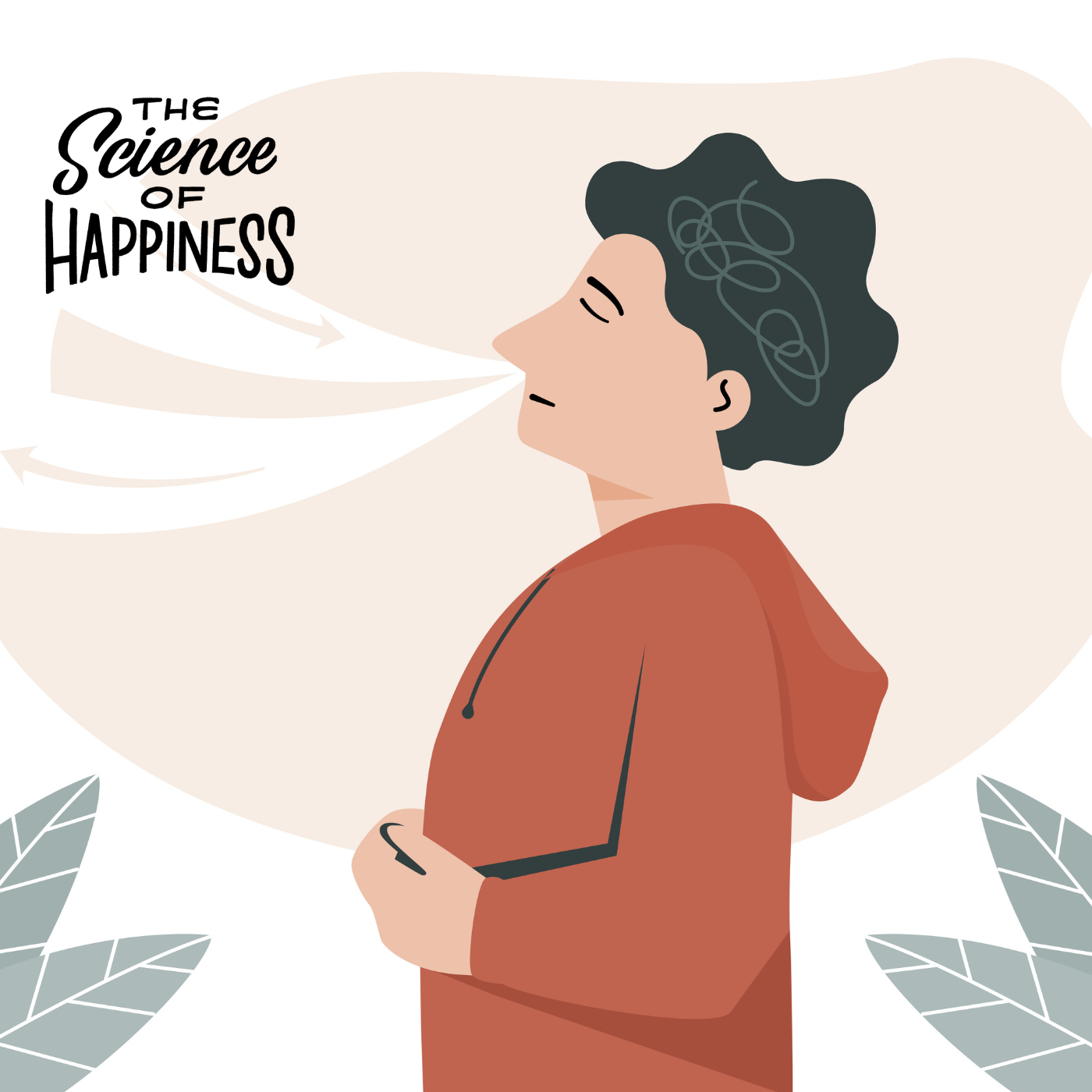

Learn why uncertainty fuels anxiety and how noticing our body’s stress signals can help us find calm. Summary: One in five adults in the U.S. report living with anxiety, and many of us struggle to control or avoid the feelings that come with it. Science shows that tuning into the body, rather than resisting discomfort, can actually reduce anxiety and strengthen resilience. Join us on The Science of Happiness as we explore what anxiety teaches us about control, uncertainty, and how to care for ourselves with more compassion. HOW TO DO THIS PRACTICE: __ CREATE A QUIET MOMENT FOR YOURSELF: Find a space where you won’t be interrupted—even just for 30 seconds. Close the door, silence your phone, and step away from distractions. TAKE A DEEP BREATH IN: Begin with one slow, steady inhale. On the exhale, let your body soften. Keep your breathing gentle, not forced. DO A QUICK SCAN: Where are you holding stress? Maybe in your chest, shoulders, or jaw. Simply notice the tightness or pressure without trying to change it. BREATHE INTO THOSE SENSATIONS: With each inhale, imagine sending your breath to the place where stress lives in your body. With each exhale, release a little of that tension—like letting it flow out. NAME WHAT’S ON YOUR MIND: Ask yourself: You don’t need to solve or fix anything—just acknowledge it. LET IT GO, EVEN BRIEFLY: Tell yourself, Allow the stress to soften as you exhale. Even 20–30 seconds can bring a sense of calm and clarity. __ TODAY’S GUESTS: JENNY LITTLE is a Health and Fitness Director at the East Bay YMCA. Add Jenny Little on LinkedIn here: HTTPS://TINYURL.COM/56VKMHRX https://tinyurl.com/56vkmhrx DR. ELISSA EPEL is a psychologist and professor at UCSF. Her research shows how chronic stress and anxiety affect our bodies at the cellular level. Learn more about Dr. Elissa Epel here: HTTPS://WWW.ELISSAEPEL.COM/ https://www.elissaepel.com/ RELATED THE SCIENCE OF HAPPINESS EPISODES: How Holding Yourself Can Reduce Stress: HTTPS://TINYURL.COM/2HVHKWE6 https://tinyurl.com/2hvhkwe6 Hot to Tap Your Way to Calm and Clarity: HTTPS://TINYURL.COM/PSMSKJYP https://tinyurl.com/psmskjyp How To Tune Out The Noise: HTTPS://TINYURL.COM/4HHEKJUH https://tinyurl.com/4hhekjuh RELATED HAPPINESS BREAKS: Make Uncertainty Part of the Process: HTTPS://TINYURL.COM/234U5DS7 https://tinyurl.com/234u5ds7 A Meditation for When You Feel Uneasy: HTTPS://TINYURL.COM/4X27UT3P https://tinyurl.com/4x27ut3p A Meditation For When You Have Too Much To Do: HTTPS://TINYURL.COM/5DVK3D7M https://tinyurl.com/5dvk3d7m Tell us about your experience with this practice. Email us at happinesspod@berkeley.edu or follow on Instagram @HAPPINESSPOD https://www.instagram.com/scienceofhappinesspod/#. Help us share The Science of Happiness! Leave us a 5-star review on Apple Podcasts and share this link with someone who might like the show: HTTPS://TINYURL.COM/2P9H5AAP https://tinyurl.com/2p9h5aap Transcription: HTTPS://TINYURL.COM/MSKVFMV4 https://tinyurl.com/mskvfmv4
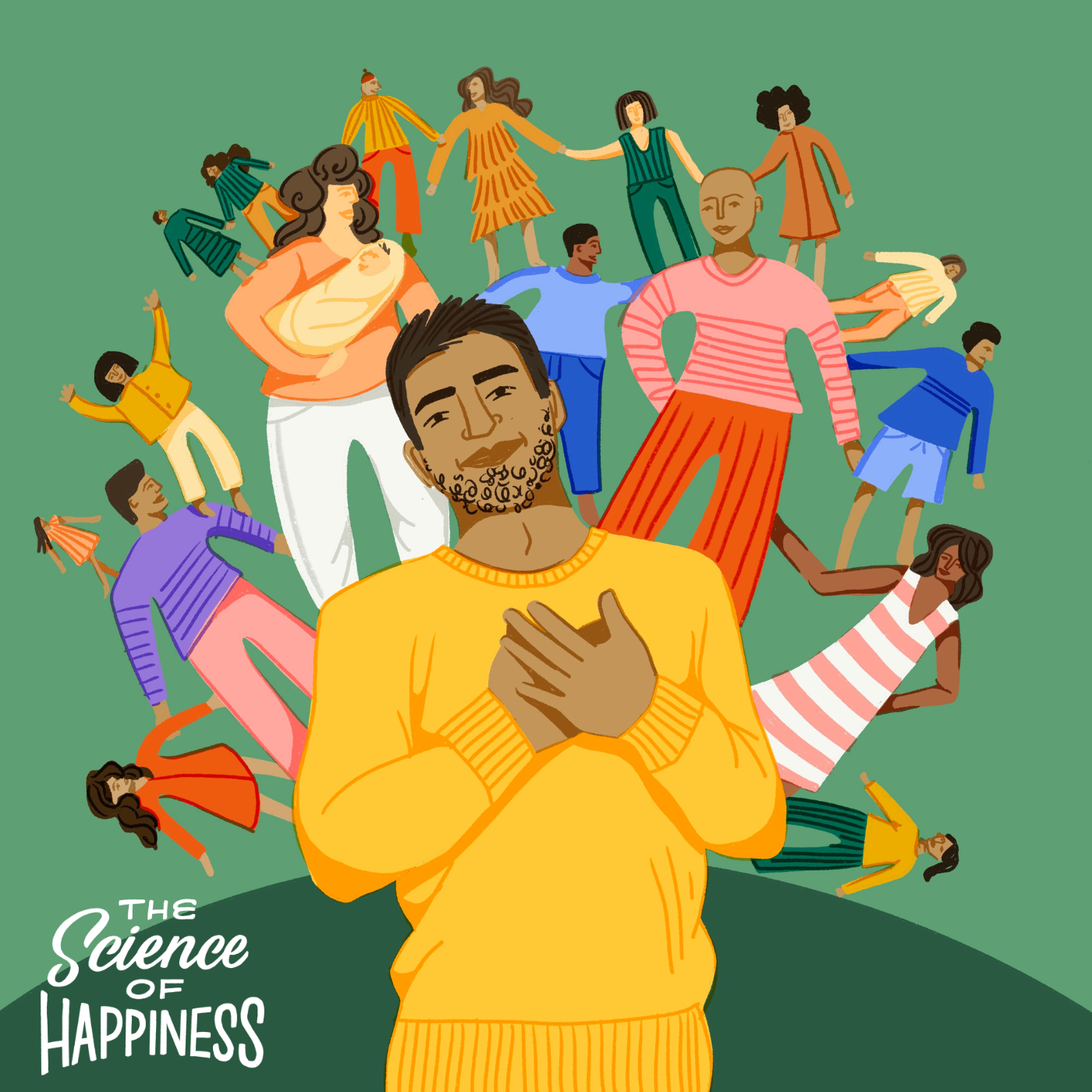

When was the last time you thought about your ancestors? This guided meditation by Indigenous scholar Yuria Celidwen will help you connect to your heritage and reap the potent benefits of remembering your roots. HOW TO DO THIS PRACTICE: __ ARRIVE AND CENTER: Find a comfortable position. Close your eyes if you’d like. Place your attention at the center of your chest. Notice how your chest expands as you inhale, pauses, and gently releases as you exhale. Rest in that pause between breaths. OPEN THE HEART SPACE: Imagine your chest softening and opening. With each breath, sense a feeling of spaciousness there. Let this space become an anchor to return to. INVITE YOUR LINEAGE: In that pause of breath, bring awareness to your ancestors. Elders of the past, present, and those yet to come. Acknowledge the richness and complexity of your lineage. REMEMBER ORIGIN STORIES: Call to mind the stories of your elders and their elders before them. Picture their journeys, the lands they once touched, and the lives they carried forward. Imagine their footsteps across the earth, leading to where you stand today. CONNECT LAND AND HEART: Visualize the lands your ancestors belonged to. The soils, waters, and skies that sustained them. Bring those lands into the center of your chest, merging them with your breath, your heart, and your pause. Feel the connection ripple from them to you, and from you back to them. REST IN HOME AND BELONGING: Let the word echo silently in your heart. With each breath, feel this home expand outward—into belonging, togetherness, and care for all living beings and for the Earth itself. Rest in that pulse of vastness and possibility. __ TODAY’S HAPPINESS BREAK GUIDE: DR. YURIA CELIDWEN is an indigenous scholar of contemplative studies, and author of the book, FLOURISHING KIN: INDIGENOUS FOUNDATIONS FOR COLLECTIVE WELL-BEING https://www.soundstrue.com/products/flourishing-kin?srsltid=AfmBOoqkuMiNsQ4S0g-V-juqEJLCyY6WWHcpTmqZGb4SFwryAGnDxJa9. Learn more about Dr. Celidwen: HTTPS://WWW.YURIACELIDWEN.COM/ https://www.yuriacelidwen.com/ RELATED HAPPINESS BREAK EPISODES: Where Did You Come From: HTTPS://TINYURL.COM/2Y9UYJJ6 https://tinyurl.com/2y9uyjj6 How To Tune Into Water’s Restorative Power: HTTPS://TINYURL.COM/2K6YBZRS https://tinyurl.com/2k6ybzrs How To Ground Yourself in Nature: HTTPS://TINYURL.COM/25FTDXPM https://tinyurl.com/25ftdxpm RELATED SCIENCE OF HAPPINESS EPISODES: Are You Following Your Inner Compass: HTTPS://TINYURL.COM/Y2BH8VVJ https://tinyurl.com/y2bh8vvj How Water Heals: HTTPS://TINYURL.COM/UTUHRNH3 https://tinyurl.com/utuhrnh3 Follow us on Instagram: @SCIENCEOFHAPPINESSPOD https://www.instagram.com/scienceofhappinesspod/ We’d love to hear about your experience with this practice! Share your thoughts at happinesspod@berkeley.edu or use the hashtag #happinesspod. Find us on Apple Podcasts: HTTPS://TINYURL.COM/2P9H5AAP https://tinyurl.com/2p9h5aap Help us share Happiness Break! Leave a 5-star review and share this link: HTTPS://TINYURL.COM/2P9H5AAP https://tinyurl.com/2p9h5aap HTTPS://TINYURL.COM/YCY9XAZC https://tinyurl.com/ycy9xazc
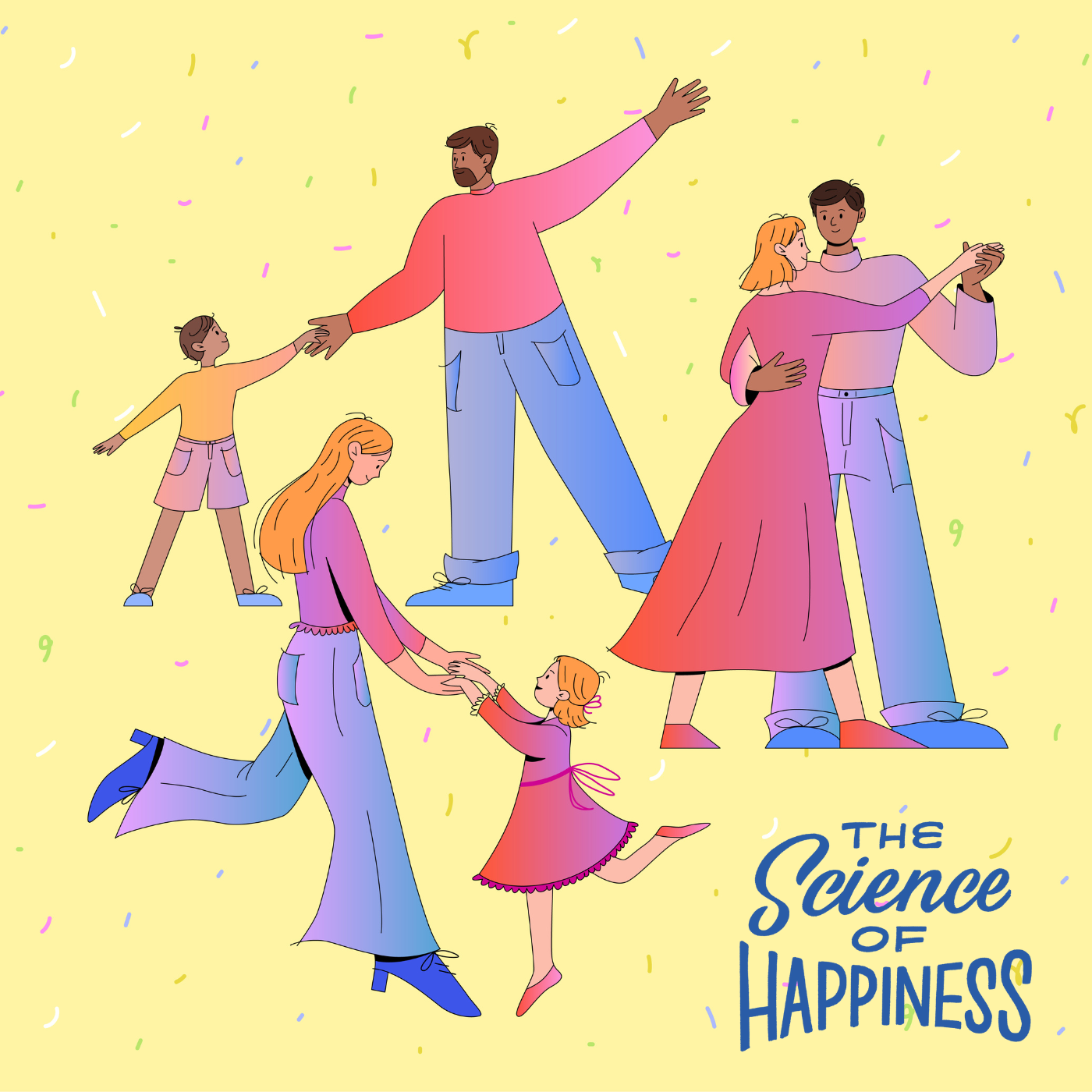

Even just a few minutes of dancing can shift energy, release emotions, and remind us to care for ourselves while we care for others. Summary: Dance isn’t just fun—it’s scientifically shown to make us happier, ease stress, and strengthen social bonds. From swaying in the kitchen to joining a community class, movement helps us regulate our nervous systems and reconnect with joy. In this episode of , we explore what the science says about how dancing supports well-being for parents, caregivers, and families. HOW TO DO THIS PRACTICE: __ PICK A SONG YOU LOVE: Choose music that makes you want to move. Even if it’s just a little sway. It could be something upbeat or a song from your childhood that feels comforting. START SMALL: Give yourself permission to move for just five minutes. No pressure to “work out”—the goal is to shift your energy and lift your mood. FOLLOW YOUR BODY: Sway, step, shake, or spin. There’s no right or wrong way. Let your body lead instead of worrying about looking a certain way. PLAY WITH PAUSING: Try stopping mid-song for a “freeze” moment, then move again. Pausing helps build awareness, self-control, and a sense of play. INVITE CONNECTION: If you have kids, family, or friends around, pull them into the movement. Science shows that dancing together strengthens bonds and amplifies joy. RELEASE AND RESET: Notice how you feel after moving— lighter, calmer, maybe more grounded. Let dance be a way to release tension and return to your day with more energy. __ TODAY’S GUESTS: MAGDALENE MARTINEZ is a licensed clinical social worker who works with children, teens and adults. Learn more about Magdalene here: HTTPS://WWW.OCEANDUSTWELLNESS.COM/ https://www.oceandustwellness.com/ DR. ÖZGE UGURLU is a behavioral scientist in the social interaction lab at UC Berkeley. Her research centers on emotions, self-control, and child development. Add Dr. Ugurlu on Linkedin here: HTTPS://WWW.LINKEDIN.COM/IN/OZGE-UGURLU https://www.linkedin.com/in/ozge-ugurlu RELATED THE SCIENCE OF HAPPINESS EPISODES: Caring for Caregivers Series: HTTPS://TINYURL.COM/4K2HV47J https://tinyurl.com/4k2hv47j https://vanleerfoundation.org/ https://earlychildhoodmatters.online/ Tell us about your experience with this practice. Email us at happinesspod@berkeley.edu or follow on Instagram @HAPPINESSPOD https://www.instagram.com/scienceofhappinesspod/#. Help us share The Science of Happiness! Leave us a 5-star review on Apple Podcasts and share this link with someone who might like the show: HTTPS://TINYURL.COM/2P9H5AAP https://tinyurl.com/2p9h5aap
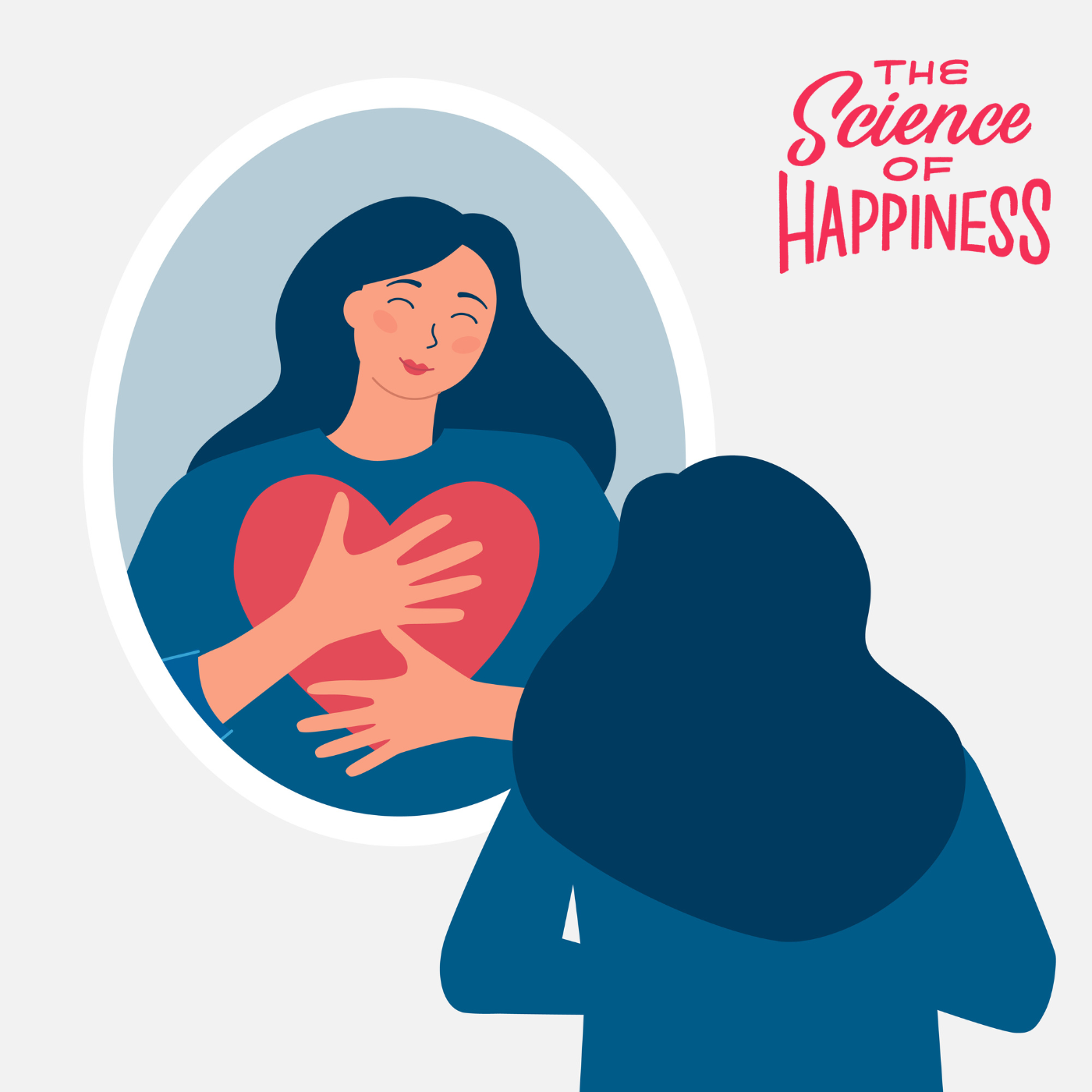

Through breath, compassion, and kind words to yourself, this guided meditation helps you forgive yourself, let go, and move forward with love. HOW TO DO THIS PRACTICE: __ GET COMFORTABLE: Sit upright but relaxed. Close your eyes or soften your gaze, and take a few slow, deep breaths. Inhale gently through your nose and slowly, twice as long, through your mouth. BRING SOMETHING TO MIND: Think of a mistake, harsh word, or regret you’re holding against yourself. Notice how it feels in your body, without judging it. ACKNOWLEDGE WHAT HAPPENED: Silently say to yourself: Take a breath. REMEMBER YOUR HUMANITY: Remind yourself: OFFER FORGIVENESS: Place a hand over your heart (or somewhere comforting) and repeat: CLOSE WITH KINDNESS: Breathe deeply. Once more, say: CHECK IN WITH YOUR BODY AGAIN: Notice if anything feels lighter or softer—maybe your breath, your shoulders, or your chest. Allow yourself to rest in that shift, however small. TAKE ONE FINAL DEEP BREATH: When you feel ready, gently open your eyes and return to your day. __ TODAY’S HAPPINESS BREAK GUIDE: DACHER KELTNER is the host of The Science of Happiness podcast and is a co-instructor of the Greater Good Science Center’s popular online course of the same name. He’s also a professor of psychology at the University of California, Berkeley. RELATED HAPPINESS BREAK EPISODES: A Meditation on Original Love: HTTPS://TINYURL.COM/5U298CV4 https://tinyurl.com/5u298cv4 Who Takes Care of You: HTTPS://TINYURL.COM/5XMFKF73 https://tinyurl.com/5xmfkf73 A Note to Self on Forgiveness: HTTPS://TINYURL.COM/Y53TKN87 https://tinyurl.com/y53tkn87 RELATED SCIENCE OF HAPPINESS EPISODES: Nine Steps to Forgiveness: HTTPS://TINYURL.COM/VB7KK5KY https://tinyurl.com/vb7kk5ky How to Show Up For Yourself: HTTPS://TINYURL.COM/56KTB9XC https://tinyurl.com/56ktb9xc https://ggsc.berkeley.edu/what_we_do/major_initiatives/forgiveness https://www.discoverforgiveness.org/ Follow us on Instagram: @SCIENCEOFHAPPINESSPOD https://www.instagram.com/scienceofhappinesspod/ We’d love to hear about your experience with this practice! Share your thoughts at happinesspod@berkeley.edu or use the hashtag #happinesspod. Find us on Apple Podcasts: HTTPS://TINYURL.COM/2P9H5AAP https://tinyurl.com/2p9h5aap Help us share Happiness Break! Leave a 5-star review and share this link: HTTPS://TINYURL.COM/2P9H5AAP https://tinyurl.com/2p9h5aap : HTTPS://TINYURL.COM/YH2A5URT https://tinyurl.com/yh2a5urt
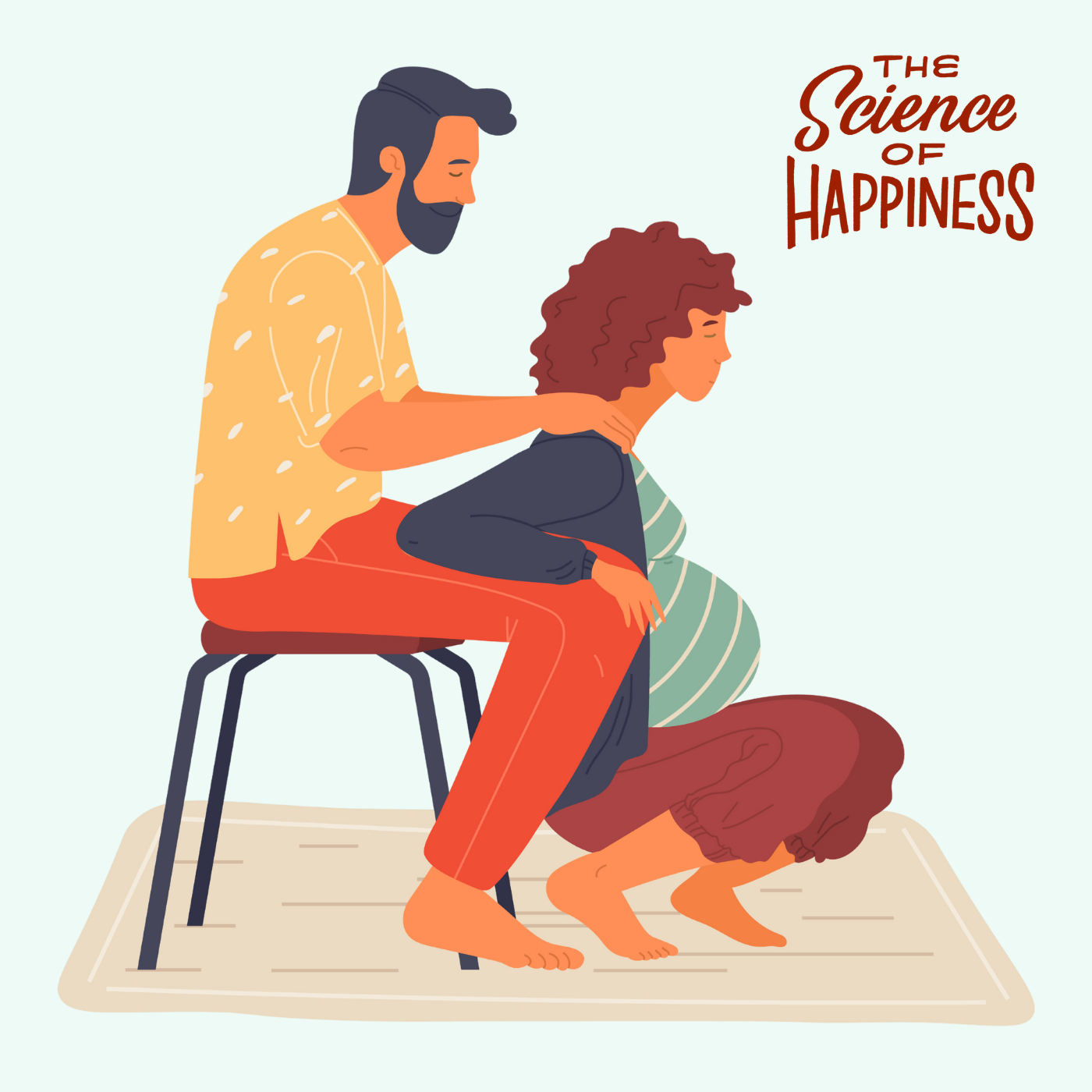

Research shows that simple practices such as self-hugs, soothing touch, and hand-to-heart can calm the nervous system, supporting caregivers and the children in their care. Summary: From parents to teachers, caregiving can be overwhelming and exhausting. This episode of The Science of Happiness dives into simple touch-based strategies that promote calm, reduce stress, and foster stronger connections. Researchers share how even brief moments of self-soothing or supportive touch can improve mental and physical health for caregivers and children. HOW TO DO THIS PRACTICE: __ SIT OR STAND COMFORTABLY and take a moment to notice your body. Soften your jaw and shoulders. If it feels safe, close your eyes or lower your gaze. PLACE ONE HAND ON YOUR BELLY, both hands over your heart, or give yourself a self-hug— whatever feels most comfortable and natural. Let the weight of your hands feel steady and supportive. TAKE A SLOW INHALE through your nose and a longer exhale through your mouth. SILENTLY REPEAT a kind phrase to yourself, like “How can I be a friend to myself today?” and “It’s okay to make mistakes.” FEEL THE WARMTH and weight of your hands. On each exhale, invite a little ease into your face, shoulders, belly, and back. Notice any tiny shift toward calm. WRAP YOUR ARMS AROUND YOUR TORSO and apply comfortable pressure, finishing with a gentle self-hug before returning to your day. __ TODAY’S GUESTS: THERESA ALEXANDER is a pre-K teacher based in Arlington, Virginia, with nearly 20 years of teaching experience. She’s also a new mother. MICHAEL BANISSY is a psychology professor at University of Bristol and the author of “Touch Matters: Handshakes, Hugs, and the New Science on How Touch Can Enhance Your Well-Being.” Learn more about Michael here: HTTPS://WWW.BANISSY.COM/ https://www.banissy.com/ RELATED THE SCIENCE OF HAPPINESS EPISODES: Caring for Caregivers Series: HTTPS://TINYURL.COM/4K2HV47J https://tinyurl.com/4k2hv47j RELATED HAPPINESS BREAKS: The Healing Power of Your Own Touch: HTTPS://TINYURL.COM/Y4ZE59H8 https://tinyurl.com/y4ze59h8 https://vanleerfoundation.org/ https://earlychildhoodmatters.online/ Tell us about your experience with this practice. Email us at happinesspod@berkeley.edu or follow on Instagram @HAPPINESSPOD https://www.instagram.com/scienceofhappinesspod/#. Help us share The Science of Happiness! Leave us a 5-star review on Apple Podcasts and share this link with someone who might like the show: HTTPS://TINYURL.COM/2P9H5AAP https://tinyurl.com/2p9h5aap Transcription: HTTPS://TINYURL.COM/4PPZS8KW https://tinyurl.com/4ppzs8kw
